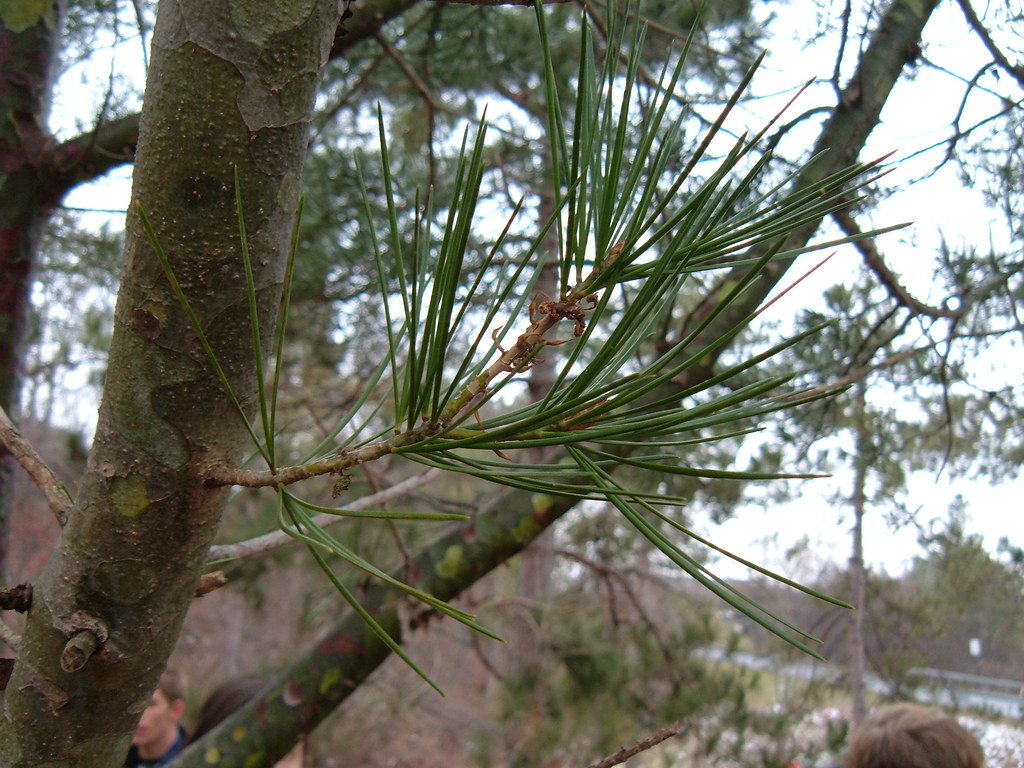Dendrology - Tree Identification
1/82
There's no tags or description
Looks like no tags are added yet.
Name | Mastery | Learn | Test | Matching | Spaced | Call with Kai |
|---|
No analytics yet
Send a link to your students to track their progress
83 Terms
Pinaceae Pseudotsuga menziesii, Douglas-fir
Strong - used for dimensional lumber, soft needles singly attached, small brown buds, smooth twigs, cone scales are papery and have seed bracts projecting beyond
Magnoliaceae Magnolia sp., magnolia
Primitive line of flowering plants, spatulate leaves that are thick and leathery with smooth edges, big fuzzy terminal buds, lenticels for gas exchange, large flowers with numerous petals
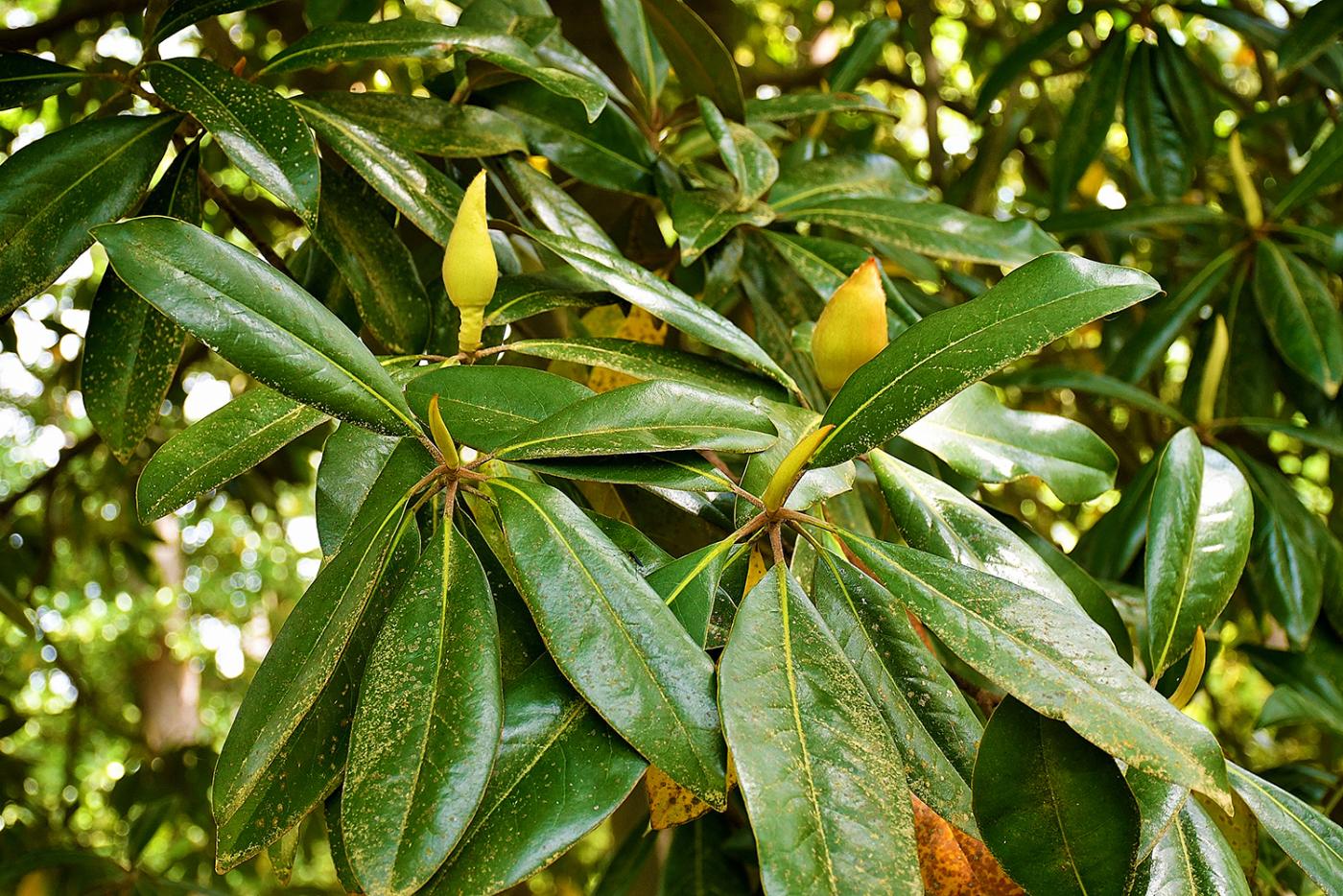
Magnoliaceae Liriodendron tulipifera, tuliptree
Four-lobed simple leaves that resemble tulips, pinnately veined, excurrent, long valvate terminal buds much larger than lateral buds - reddish-brown in the winter and enclosed by two green stipules in the summer
Taxaceae Taxus sp., yew
Common in landscape applications, hardy shrub, toxic, singly attached flat needles pointing in two directions, small scaled buds, thin and flaky bark, seeds surrounded by arils - red fleshy coating
Pinaceae Tsuga canadensis, eastern hemlock
Most shade-tolerant conifer, drooping twig tips, needles are short and flat with a lighter color and white stomatal lines on the underside, small bell-shaped cones that hang down, grayish flaky bark
Anacardiaceae Rhus aromatica, fragrant sumac
Strong smell, occupies upland/rockier sites, thicketing shrub, tripholiate compound leaves, no true terminal bud, small lateral buds
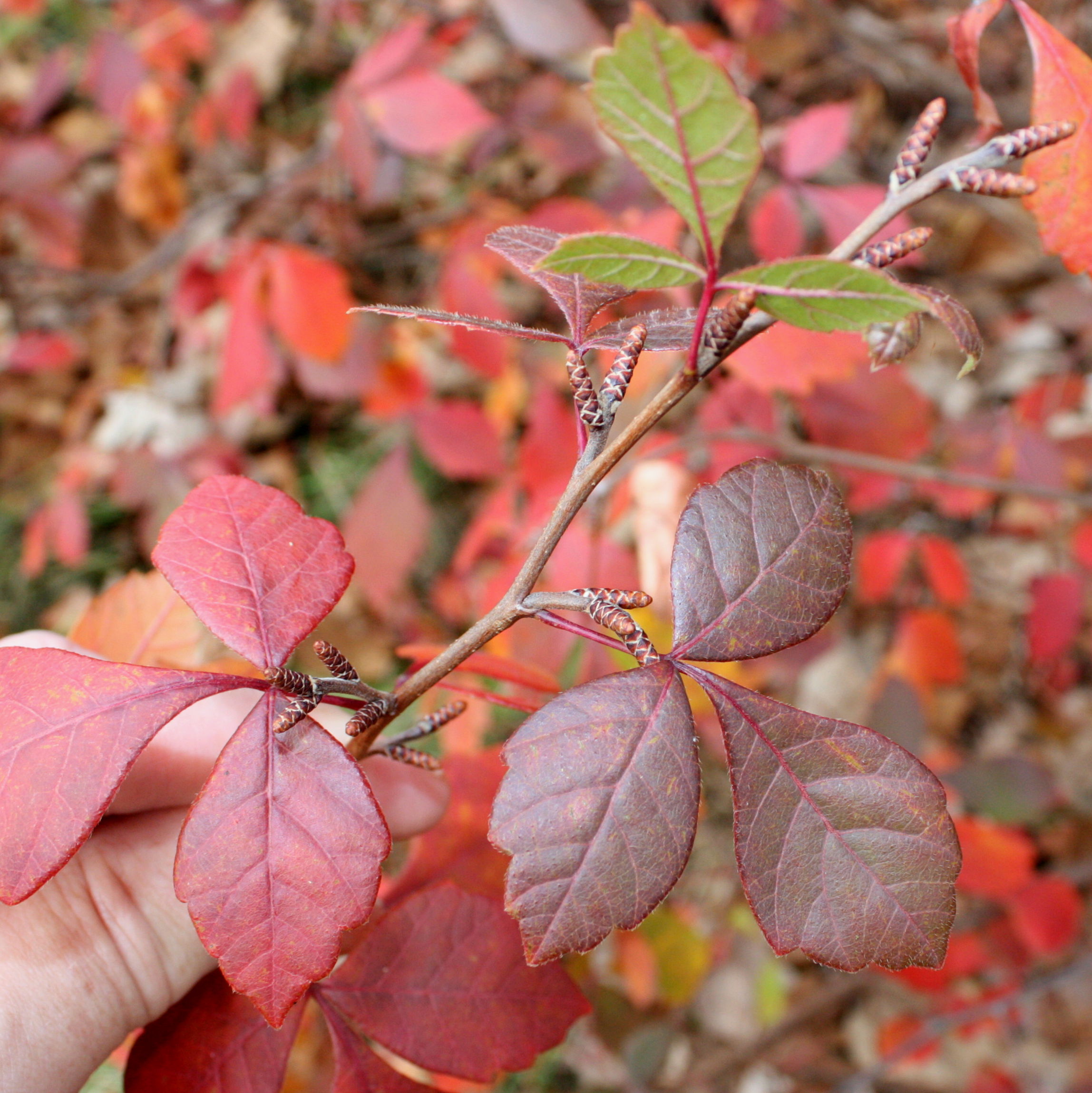
Anacardiaceae Rhus glabra, smooth sumac
Smooth twigs, thicketing dense shrub, pinnately compound leaves with serrated leaflets and single terminal leaflet, buds are enclosed within petioles, red rachis
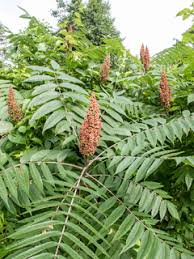
Anacardiaceae Rhus hirta, staghorn sumac
Thicketing shrub, twigs are densely fuzzy like deer antler velvet, cultivar is unique, buds are enclosed within petioles, pinnately compounds leaves with single terminal leaflet, fruits are red and densely clustered
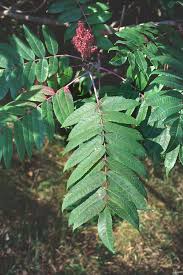
Moraceae Maclura pomifera, Osage-orange
Yellow/orange bark with strong vertical texture, latexy sap, wood is dense and rot-resistant, simple glossy pointed leaves, spur shoots on small twigs, no true terminal bud, female trees produce large green gnarled fruits
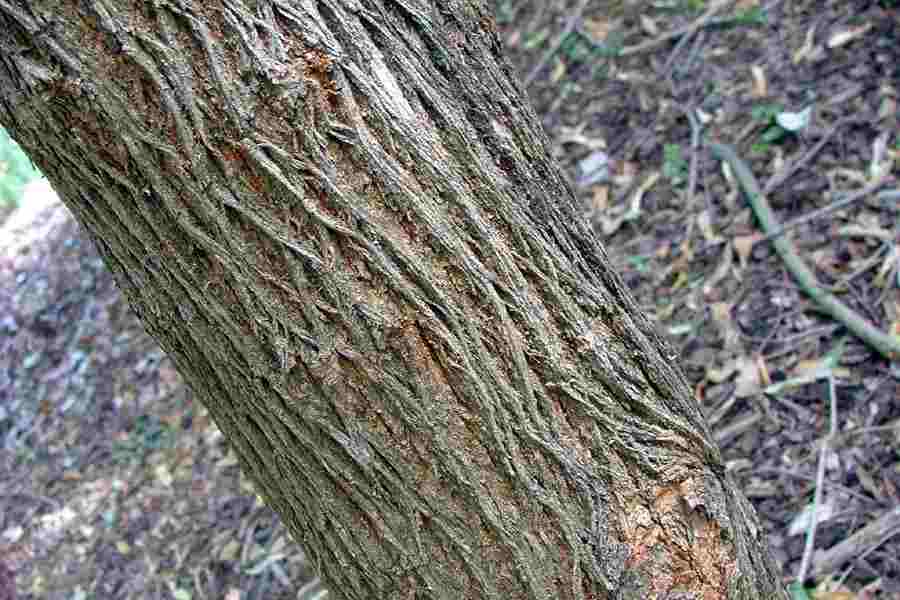
Annonaceae Asimina triloba, pawpaw
Wide-topped with sparse branches, large green fruits split into three, smooth gray bark, large entire leaves with drip tips, naked terminal buds
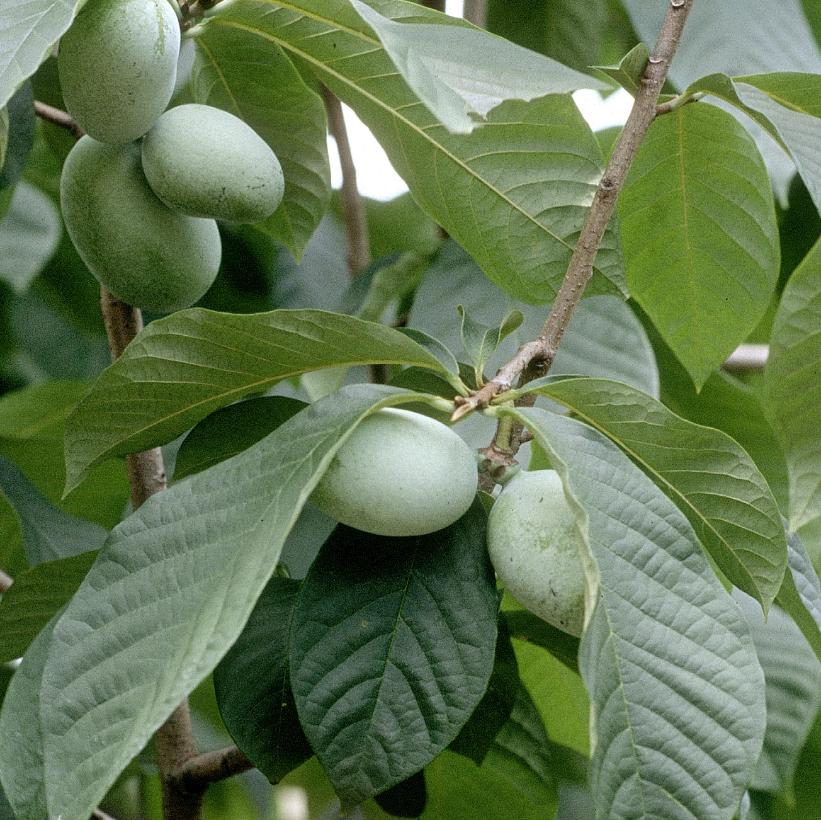
Platanaceae Platanus occidentalis, sycamore
Biggest tree east of the Rockies, big white smooth bark, simple palmately lobed maple-like leaves with shallow sinuses, no true terminal bud, fruit of multiple achenes shaped like gumballs, hollows out when old and provides important habitat for wildlife
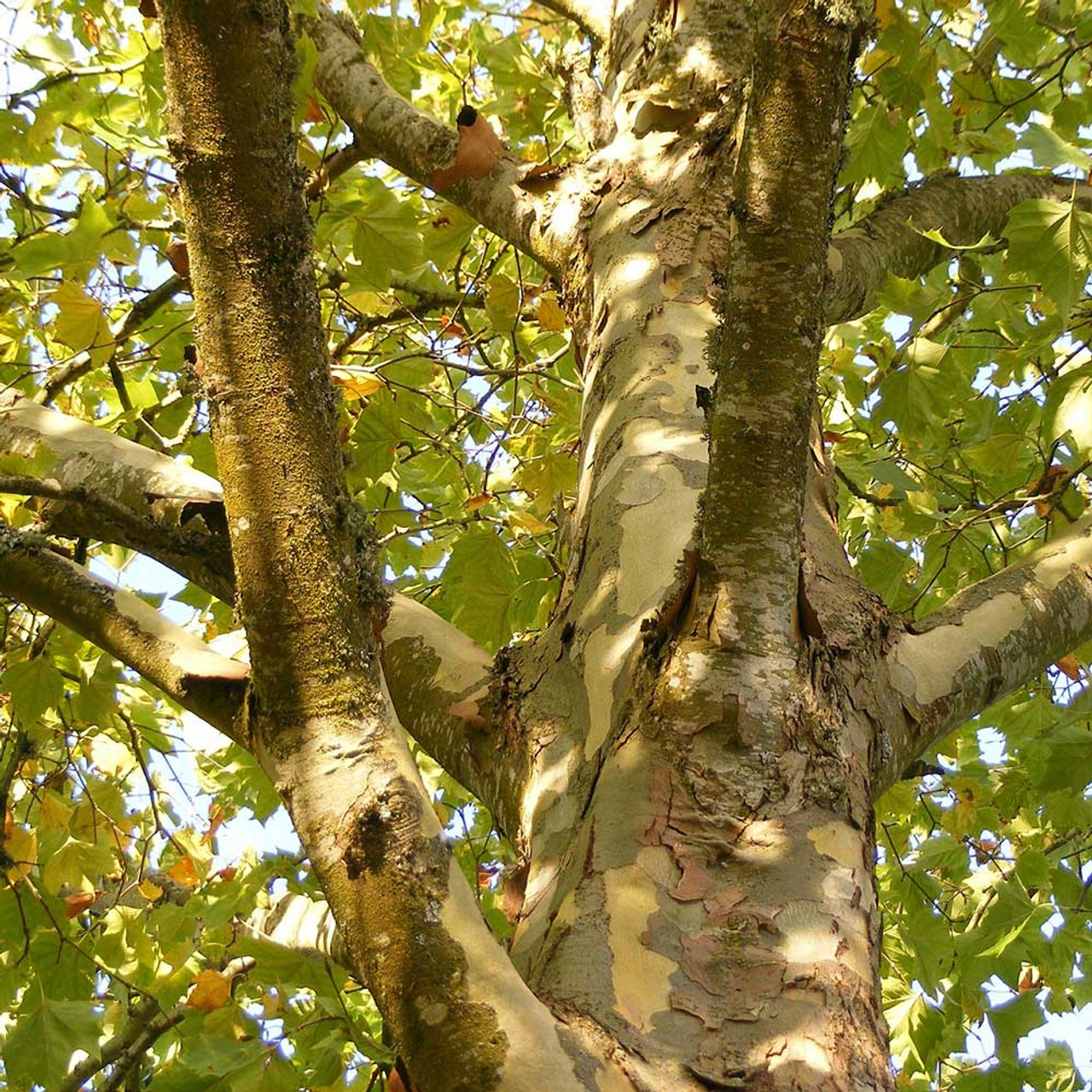
Ulmaceae Ulmus americana, American elm
Shade tree, often branches low and spreads out then droops, critically endangered in the wild, bark has thick gnarled ridges, brown scaled buds with no true terminal bud, simple serrated leaves with uneven chordate base and an acute apex
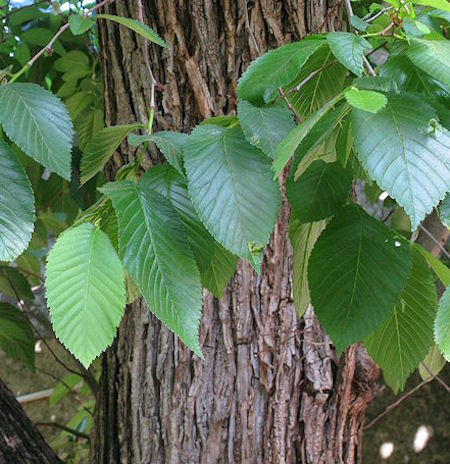
Bignoniaceae Catalpa speciosa, northern catalpa
Excurrent, large heart-shaped leaves, trunk thick at base but tapering quickly, irregular crown, fruits are long cylindrical pods, whirled arrangement, fuzzy seeds
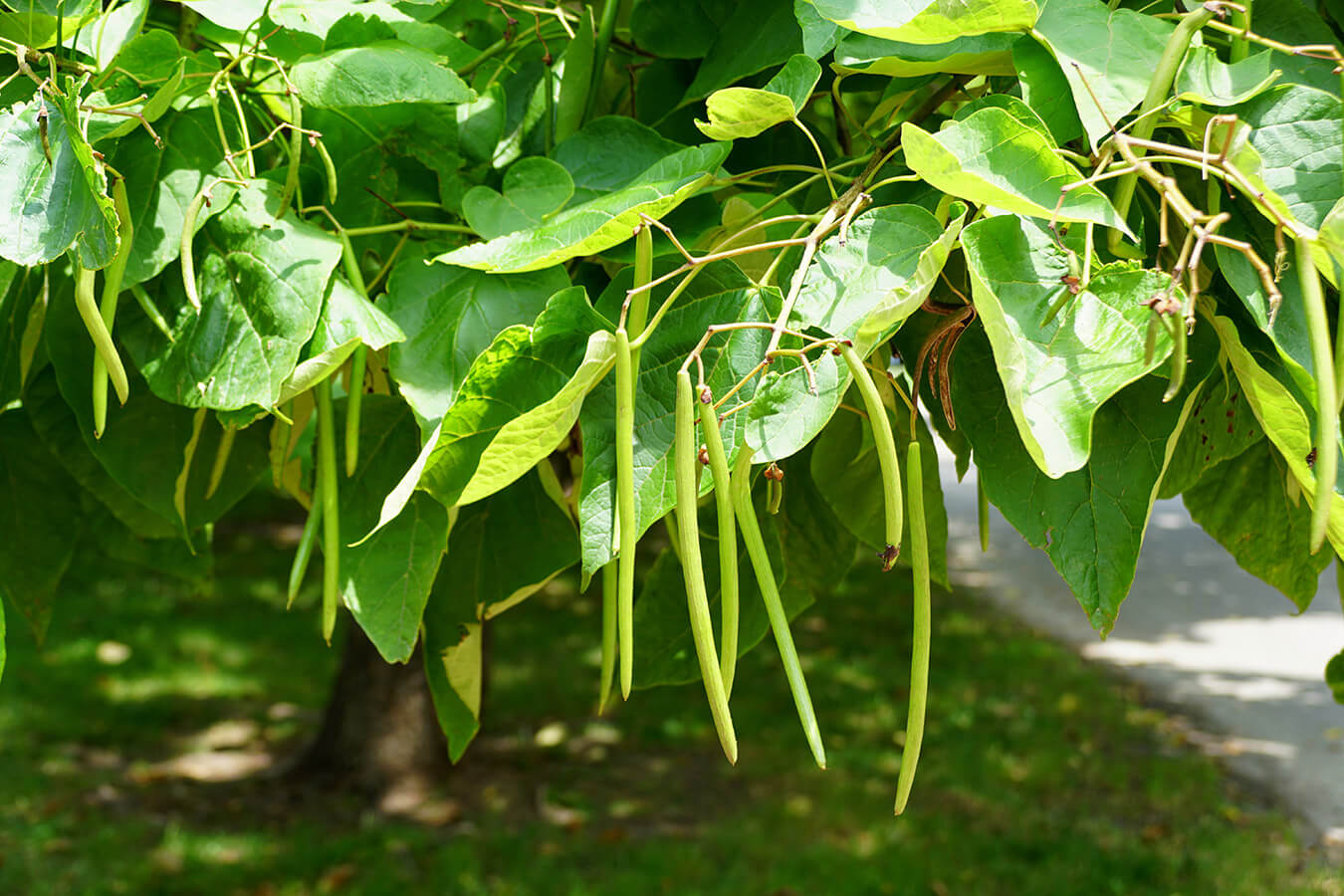
Cannabaceae Celtis occidentalis, hackberry
Bark has pronounced warty growths, purplish-black berries, twigs often clumped in witch’s broom, no true terminal bud, nipple galls on underside of many leaves, jagged margins and uneven bases and sandpaper texture
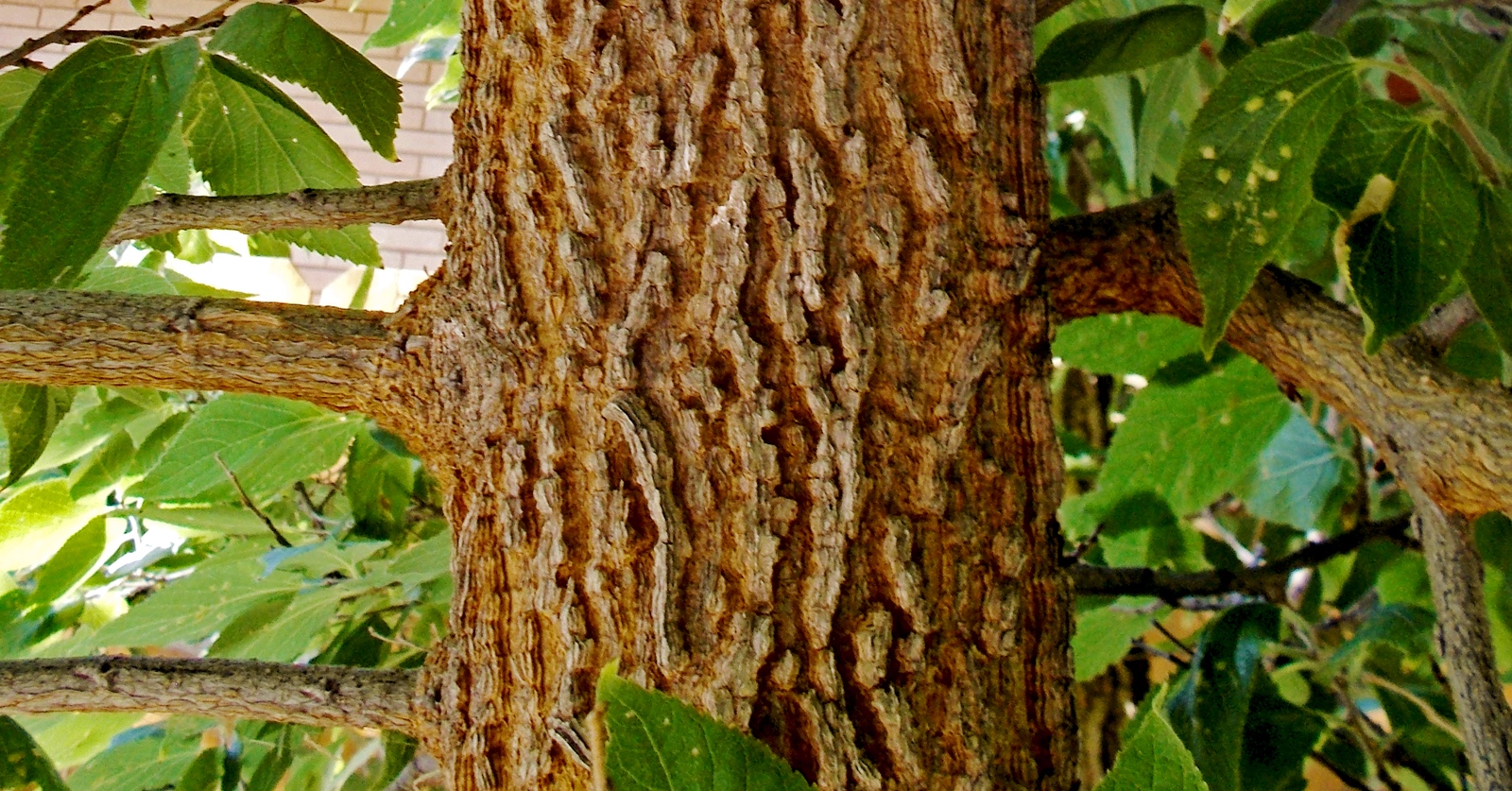
Betulaceae Betula nigra, river birch
Commonly multi-trunked, bark is papery and peeling and multicolored, messy shelf-shading, foliage is simple with serrated margins, male pre-formed pendulous catkins at the ends of twigs, female catkins are erect and become cone-shaped clusters of samaras
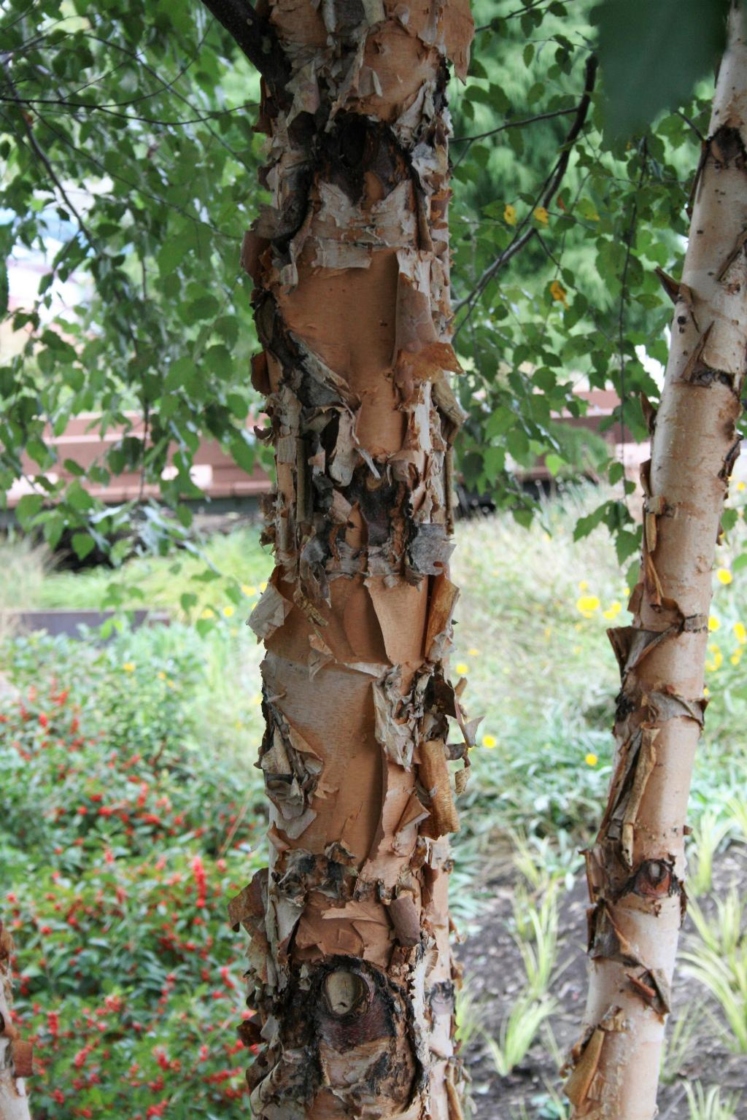
Betulaceae Corylus americana, American hazelnut
Thicketing shrub often wider than it is tall, leaves have doubly serrate margins and sandpaper texture, pre-formed male catkins found throughout the twig, female catkins are small and mature into round nuts covered by light green bracts, small imbricate buds
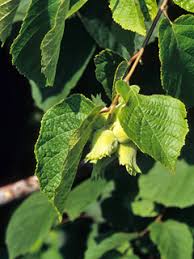
Betulaceae Carpinus caroliniana, hornbeam
Shrub to small tree, smooth gray bark looks like rippling muscles, rounded crown shape, female catkins produce fruits that are clusters of nutlets subtended by leafy three-lobed bracts, leaves are doubly serrate
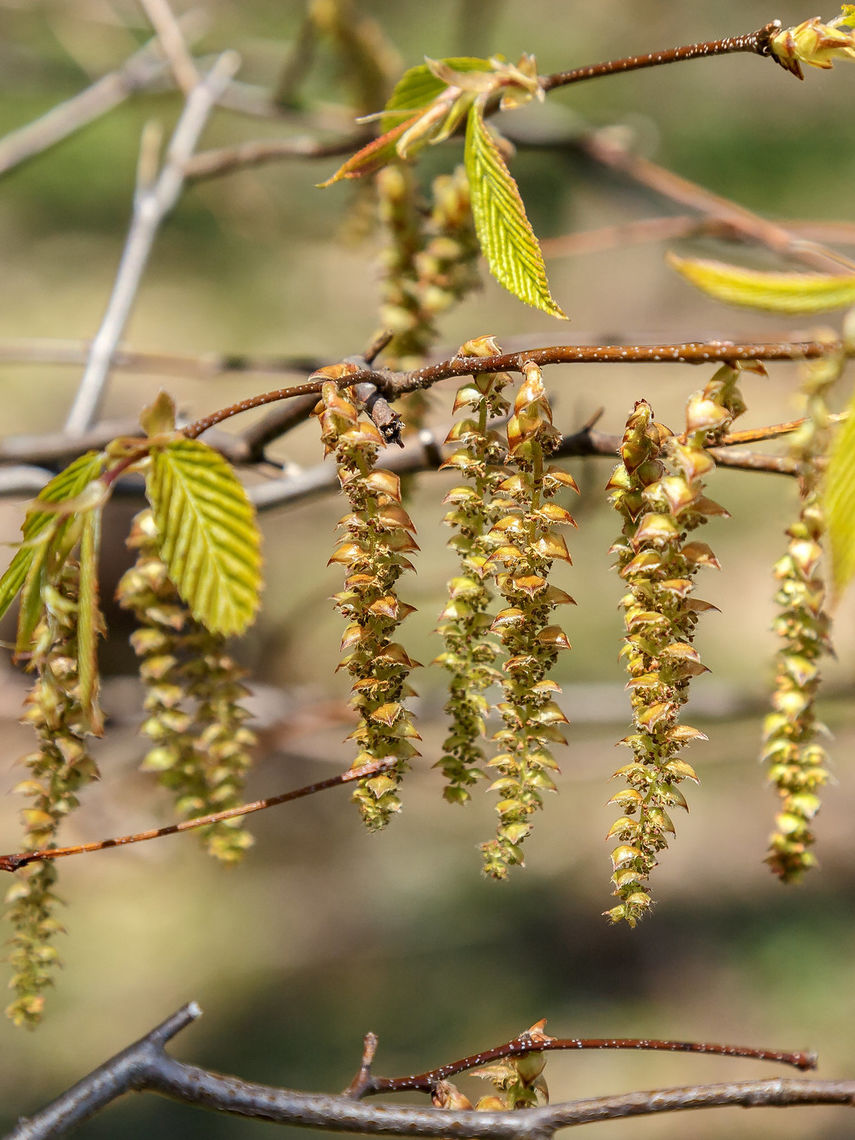
Betulaceae Betula papyrifera, paper birch
Bark is white and papery with black stomatal lines, often multi-stemmed, foliage is simple with serrated margins, male pre-formed pendulous catkins at the ends of twigs, female catkins become long clusters of samaras
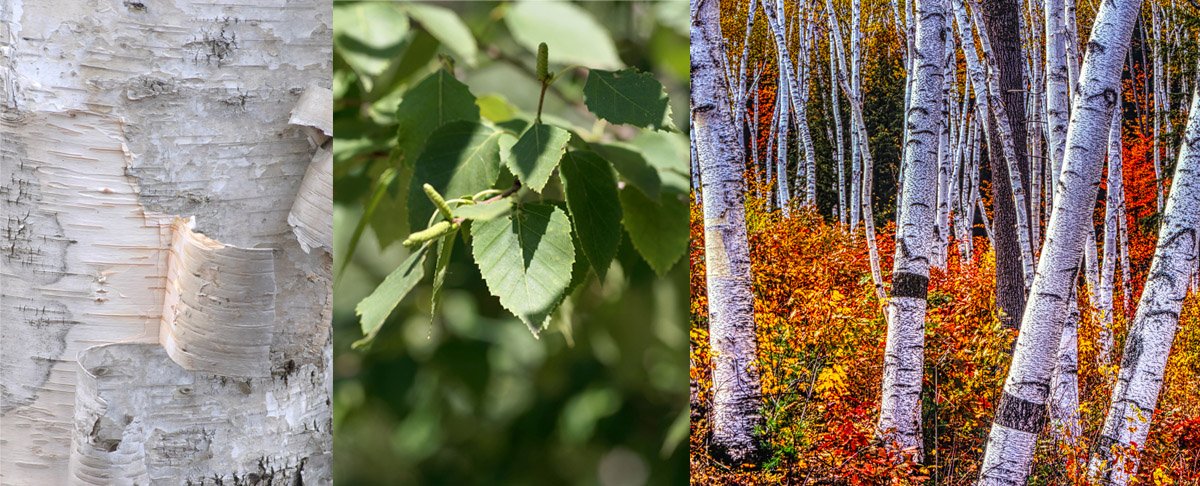
Betulaceae Ostrya virginiana, hophornbeam
Commonly single-trunked small tree, bark is textured, simple doubly serrate leaves, foliage often flat and two-ranked, fruits look like hops fruit and nutlets are completely enclosed in papery scales, catkins dangling in clusters of three at ends of twigs
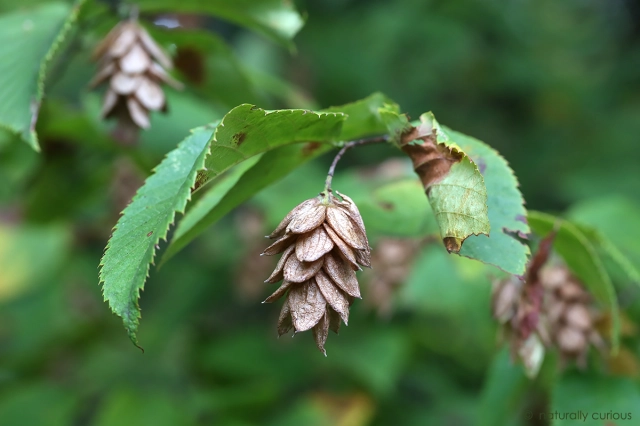
Ginkgoaceae Ginkgo biloba, ginkgo
Gymnosperm, only extant species in its division and class, evolutionarily isolated, stump sprouters, fast-growing but live long, leaves are fan-shaped and often two-lobed, venation comes from one point and petioles are long, large spur shoots form after one year of growth, females produce seeds with fleshy outer coat that are not true fruits and smell like death
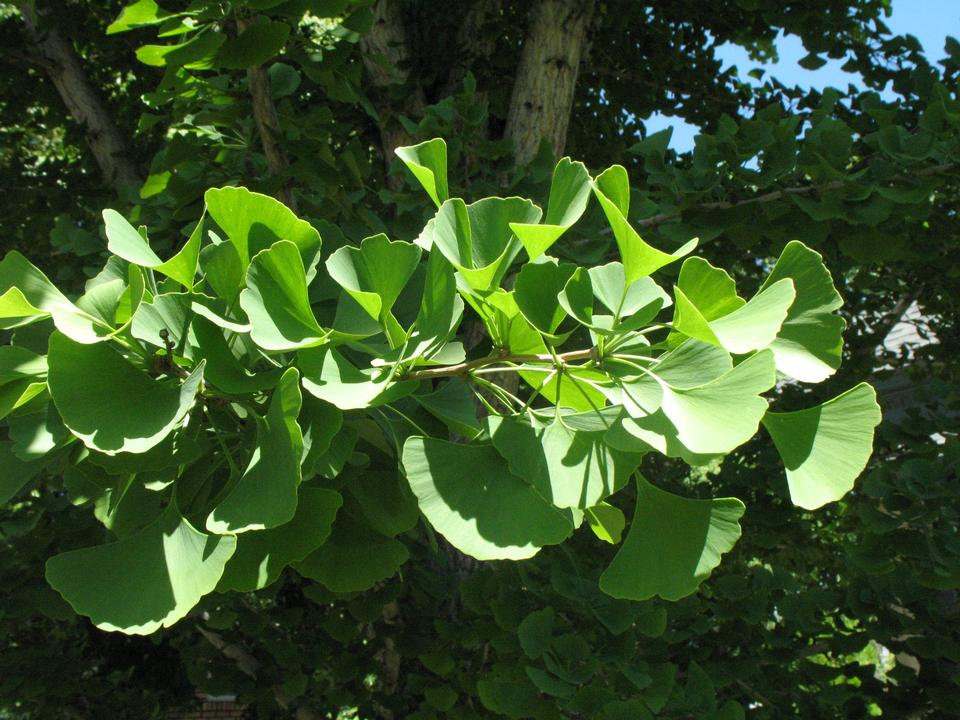
Ebenaceae Diospyros virginiana, persimmon
Large round fruits, simple leaves lighter on the underside with wavy margins, twigs are smooth and gray, bark has chunky reptilian-like rectangular blocks, open crown of contorted branches
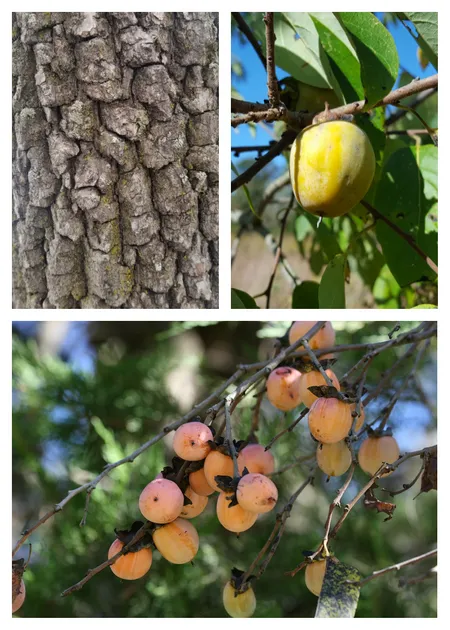
Hamamelidaceae Hamamelis virginiana, witch-hazel
Shrub form often strongly leaning, blooms and fruits at the same time, blooms are in fall after leaves are gone, flowers have four narrow yellow petals, fruits are two-capsuled and woody and look like the bottom of a pop/water bottle, disperses seeds by forcefully ejecting them, simple leaves with lighter underside, functionally naked buds with larger true terminal buds, venation is staggered and base is staggered
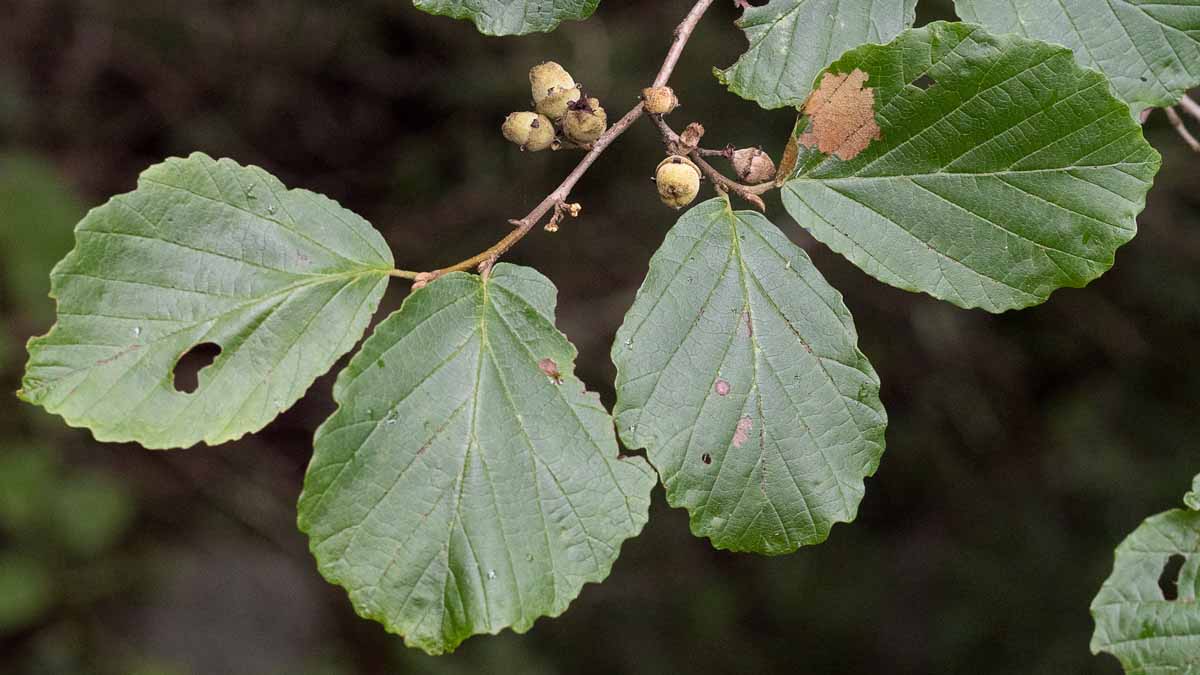
Altingiaceae Liquidambar styraciflua, American sweetgum
Conical/pyramidal shape, variety of fall colors, sap is aromatic and congeals into balls, simple palmately-lobed star-shaped leaves (5-7 lobes), margins are dentate (teeth point outward), fruits are spiky balls (multiple of capsules)
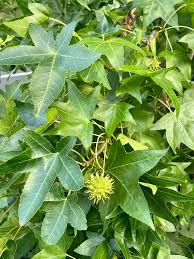
Cornaceae Cornus sericea, red-osier dogwood
Thicketing shrub, red bark, oppositely arranged, silky feel to underside of leaves, small valvate fuzzy brown terminal buds, entire margins and fibrous U-shaped veins, flowers in corymbs with four petals that become bright white berries with dark spots
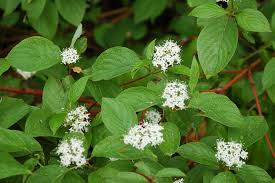
Cupressaceae Taxodium distichum, baldcypress
Deciduous conifer, buttresses on trunk and knees for structural stability, two-ranked soft leaves, deciduous branchlets with alternate individual leaves, deciduous green female cones, male cones hang in pendulous chains
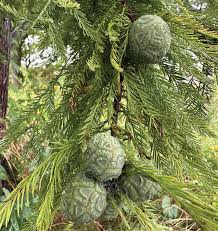
Pinaceae Larix decidua, European larch
Deciduous conifer, soft narrow needles in tufts, spur shoots, terminal buds in center of spur shoots, cones have papery scales like spruce but are held erect, flaky bark
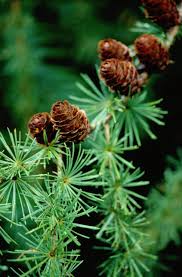
Salicaceae Populus tremuloides, quaking aspen
Smooth white bark that scars easily and has lenticels, leaves flutter and are rounder and less serrated than paper birch, pronounced buds, terminal imbricate buds, likes to grow in colonial patches
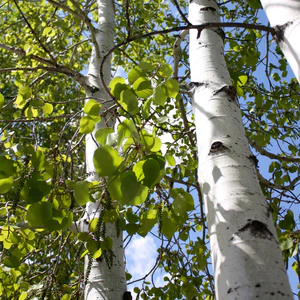
Salicaceae Salix sp., willow
Shrubs or trees, typically have mutlipe trunks, twigs are flexible and whiplike, often riparian, long narrow leaves with acute tips, no true terminal buds, persistant paired stipules at base of petioles, most recent growth is differently colored, buds generally prominent and covered by single scales
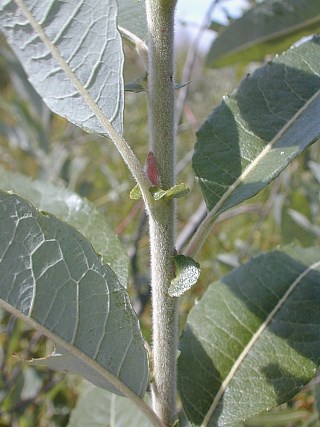
Cornaceae Cornus alternifolia, alternate-leaf dogwood
Thicketing shrub to small tree, alternate arrangement, leaves clustered at ends of branches, simple entire leaves with paired U-shaped veins, valvate terminal buds, flowers with four petals held in corymbs, fruits are drupes, branches arranged in flat horizontal layers then curve upward and diverge in Y-shapes
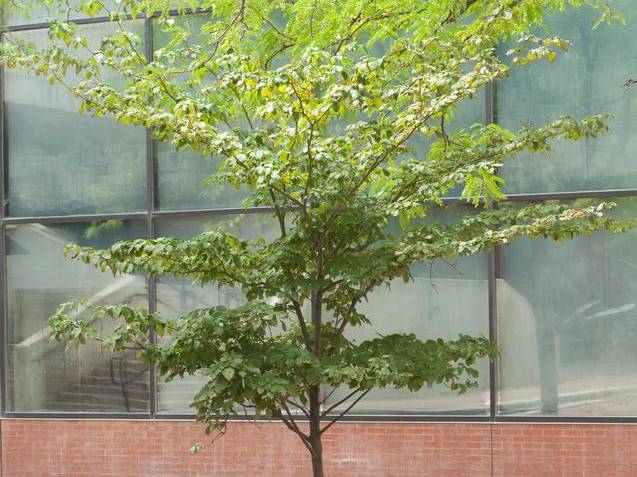
Salicaceae Populus deltoides, eastern cottonwood
Large and imposing, triangular fluttering leaves with long petioles arranged at all angles around twigs, serration along base and smooth along tip, cotton-like seeds, often multiple trunks at base, large imbricate resinous pointed terminal buds, knobby twigs, thick bark with deep furrows
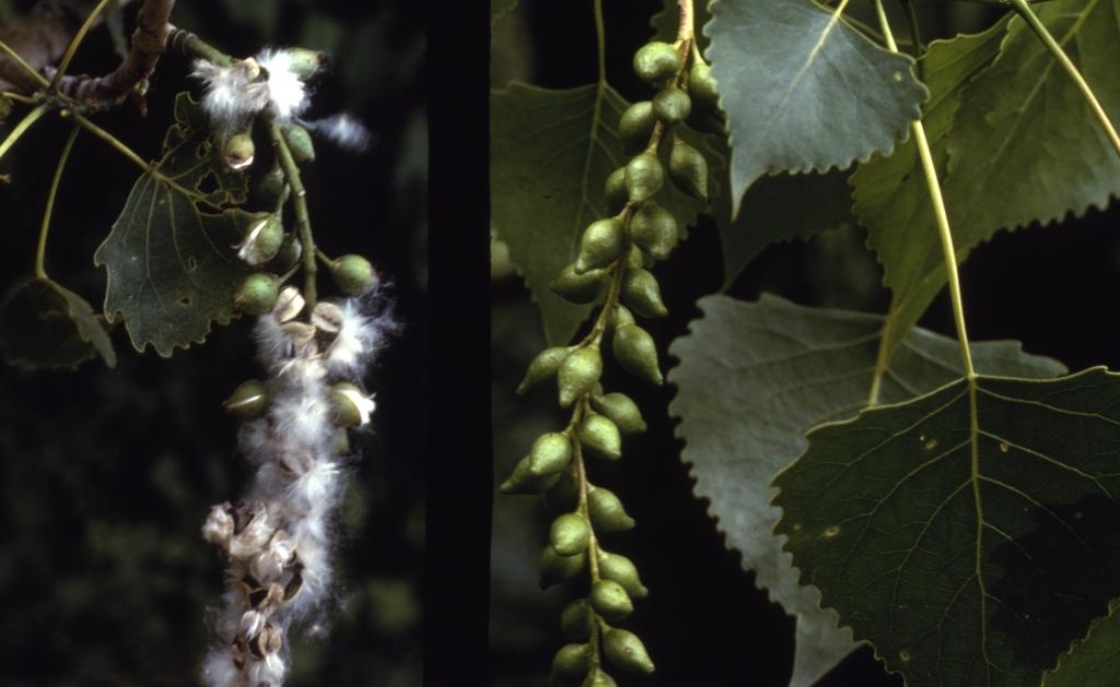
Adoxaceae Viburnum sp., viburnum
Shrub to small tree, oppositely arranged, leaves scabrous texture, valvate terminal buds often fuzzy, fruits held in corymbs - colorful drupes, large white flowers with five petals held terminally
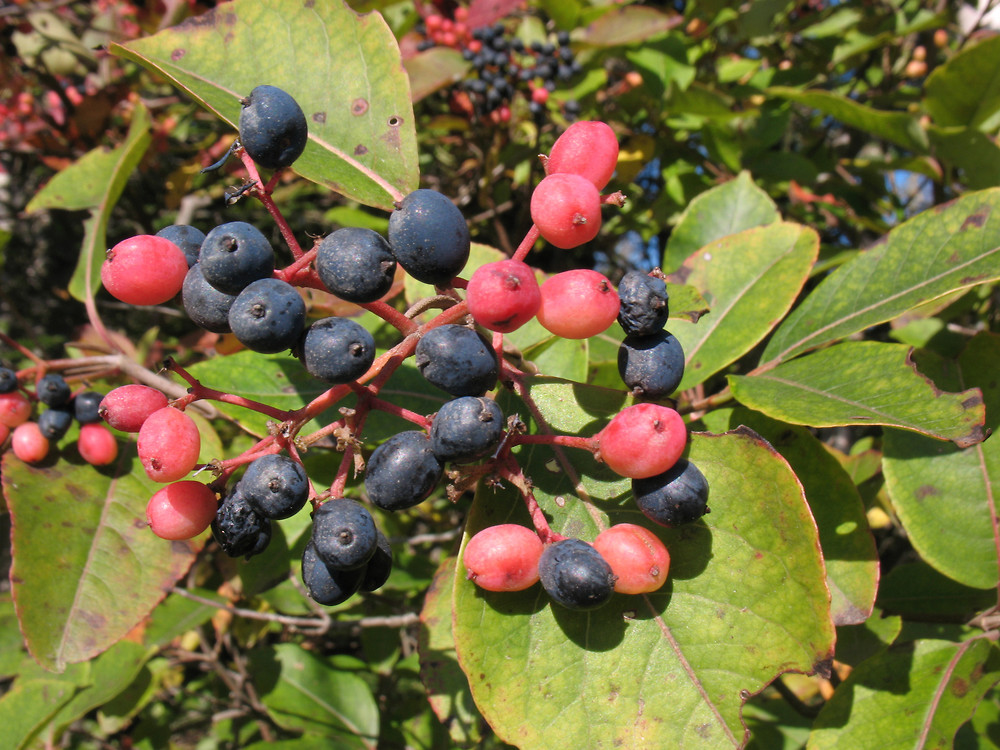
Cornaceae Cornus mas, cornelian-cherry
Shrub to small tree, bright red fruits, clusters of bright yellow flowers with four petals, oppositely arranged, simple entire leaves with fibrous U-shaped paired veins, round flower buds enclosed by downy boat-shaped bracts, leaf buds are slender and pointed, exfoliating textured bark with orange undertone all the way to twigs
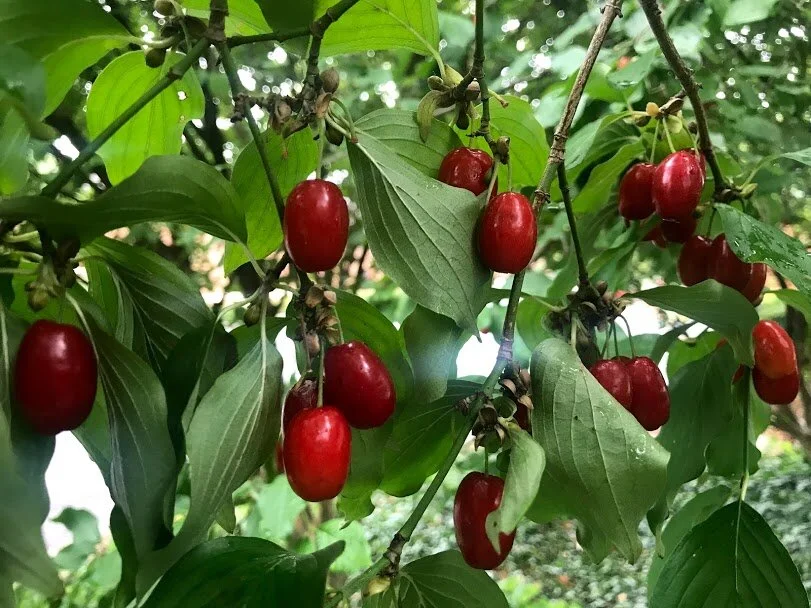
Sapindaceae Acer rubrum, red maple
Simple palmately lobed leaves (typically 3 lobes with larger middle lobes), red petioles, reddish new growth, bright red buds, red fall color, bark generally smooth but gains some texture as it matures, fruits are paired samaras, collateral buds
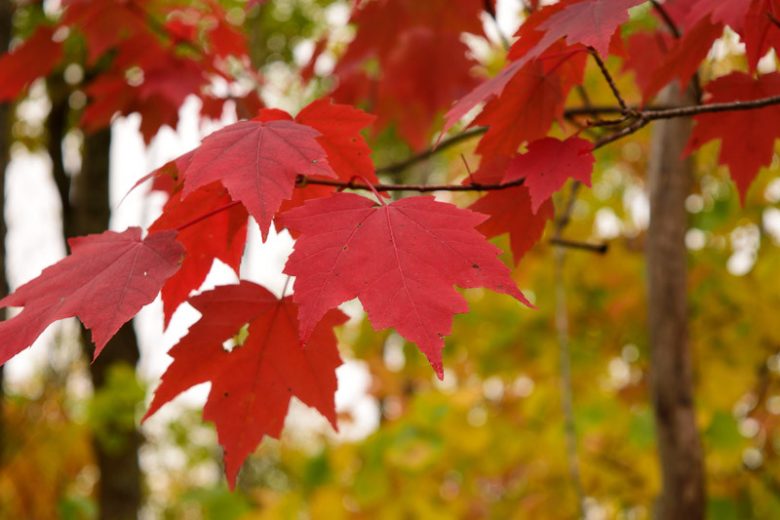
Sapindaceae Acer saccharinum, silver maple
Lighter underside of leaves, spreading form with drooping branches, strappy exfoliating bark, simple palmately lobed leaves (5 lobes), deep sinuses that come to a V-shape, entire margins and large teeth, collateral buds, large paired samaras at a 90 degree angle
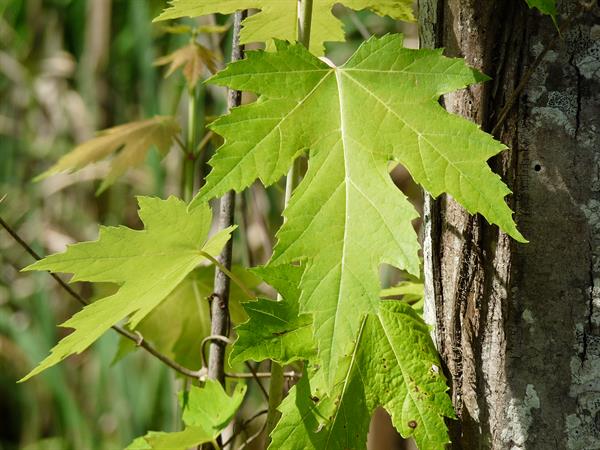
Sapindaceae Acer ginnala, Amur maple
Most often shrubby, simple palmately lobed (3-5 lobes with middle much larger), coarsely serrated margins, small buds, small samaras held in clusters at at narrow angles
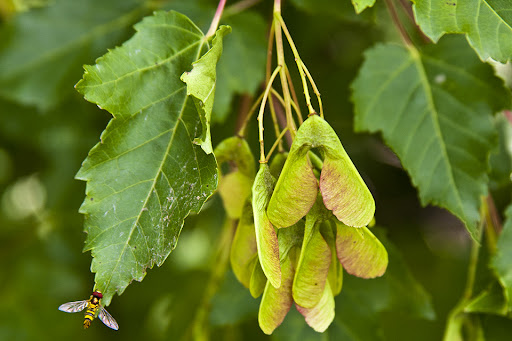
Sapindaceae Aesculus hippocastanum, horsechestnut
Oppositely arranged, palmately compound (5-7 leaflets finely serrated and widest near tip), long petioles, underleaf paler green, huge imbricate resinous terminal buds, smaller resinous lateral buds, large round fruits, prone to leaf scorch and blight
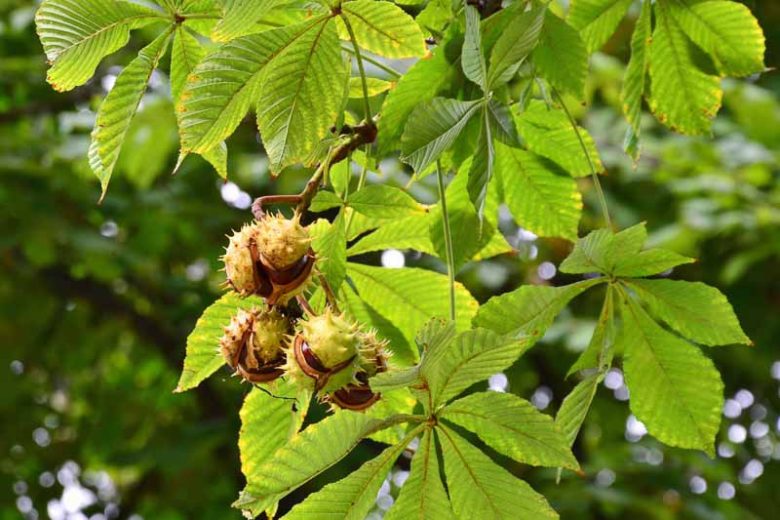
Sapindaceae Acer platanoides, Norway maple
Dense canopy, bark is fine textured but does not peel, large simple palmately lobed (5-9 lobes that are blocky and evenly sized), milky white sap, large terminal dark brown buds, large flat samaras like mustaches
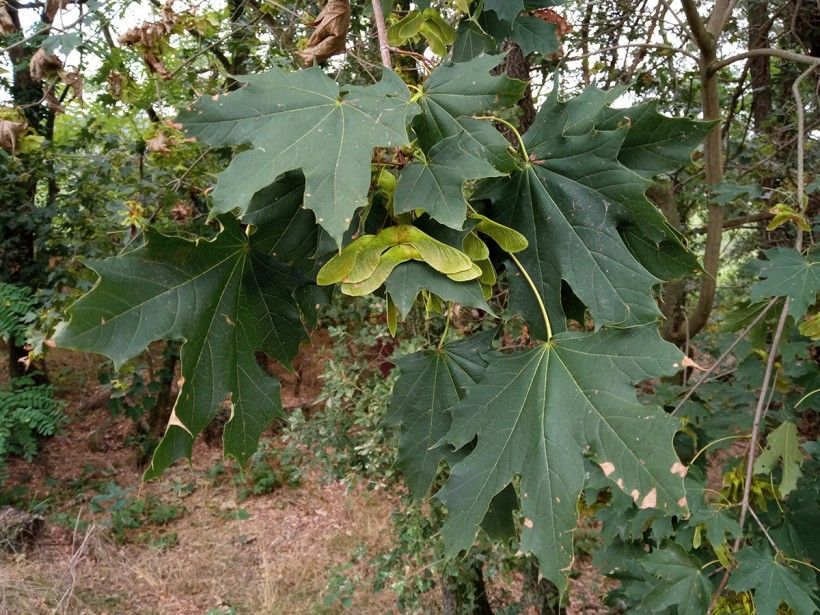
Sapindaceae Acer saccharum, sugar maple
Variety of fall colors, simple palmately lobed (typically 5 lobes with entire margins and sub-lobes), deep U-shaped sinuses and tapered lobes, conical pointed terminal buds, textured bark on older trees
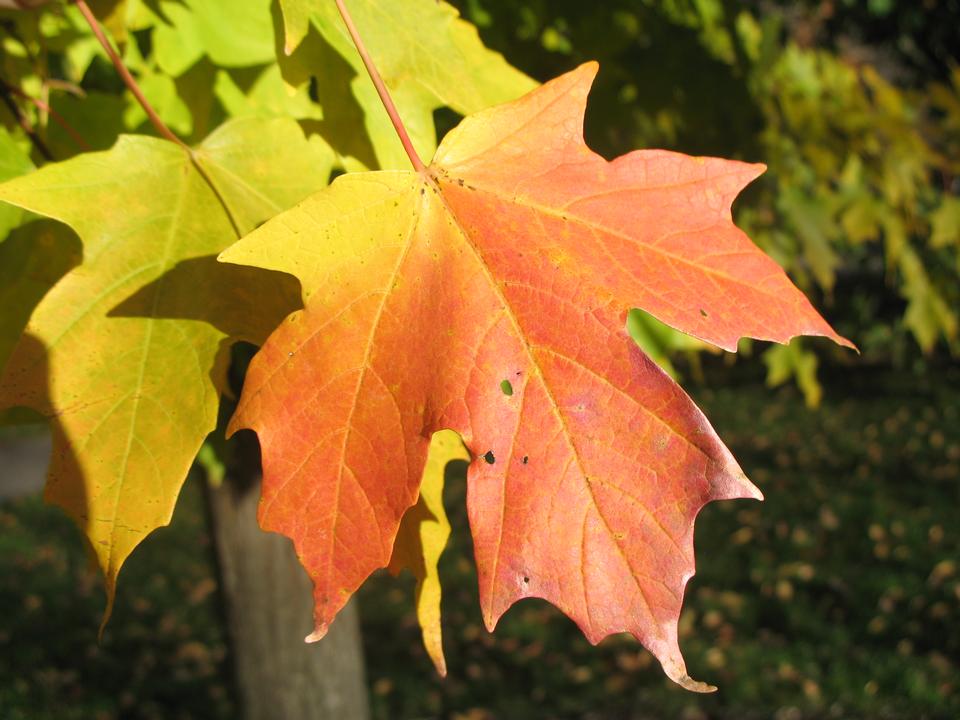
Sapindaceae Aesculus glabra, Ohio buckeye
Husks of nuts are spiny and split, terminal panicle flowers, oppositely arranged, palmately compound leaves (typically 5 finely serrated leaflets with tapered points), large chunky terminal buds that are not resinous, textured bark
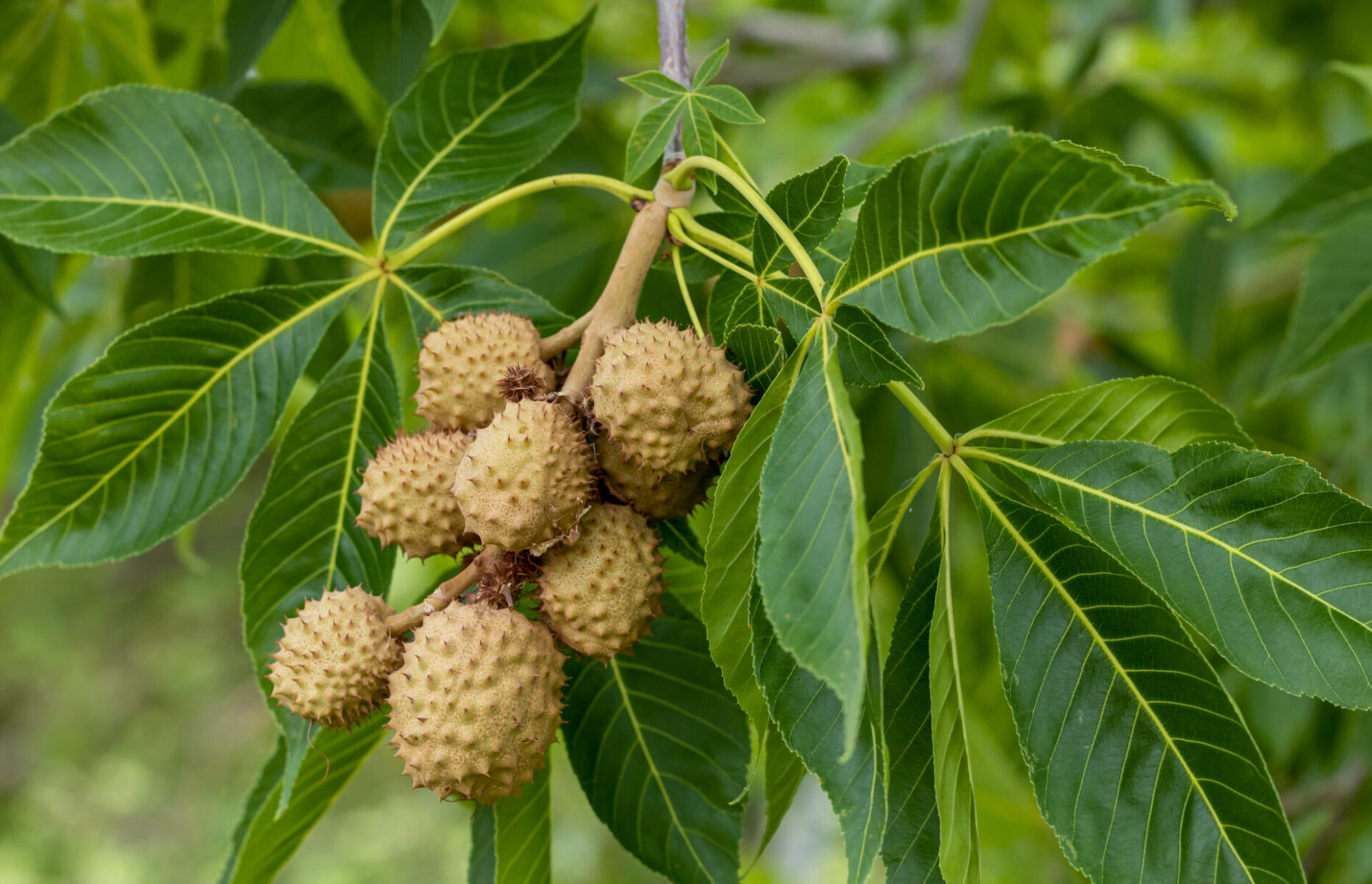
Oleaceae Syringa vulgaris, common lilac
Panicles of flowers, most often thicketing shrubs, opposite arrangement, entire margins and chordate bases, small paired terminal buds
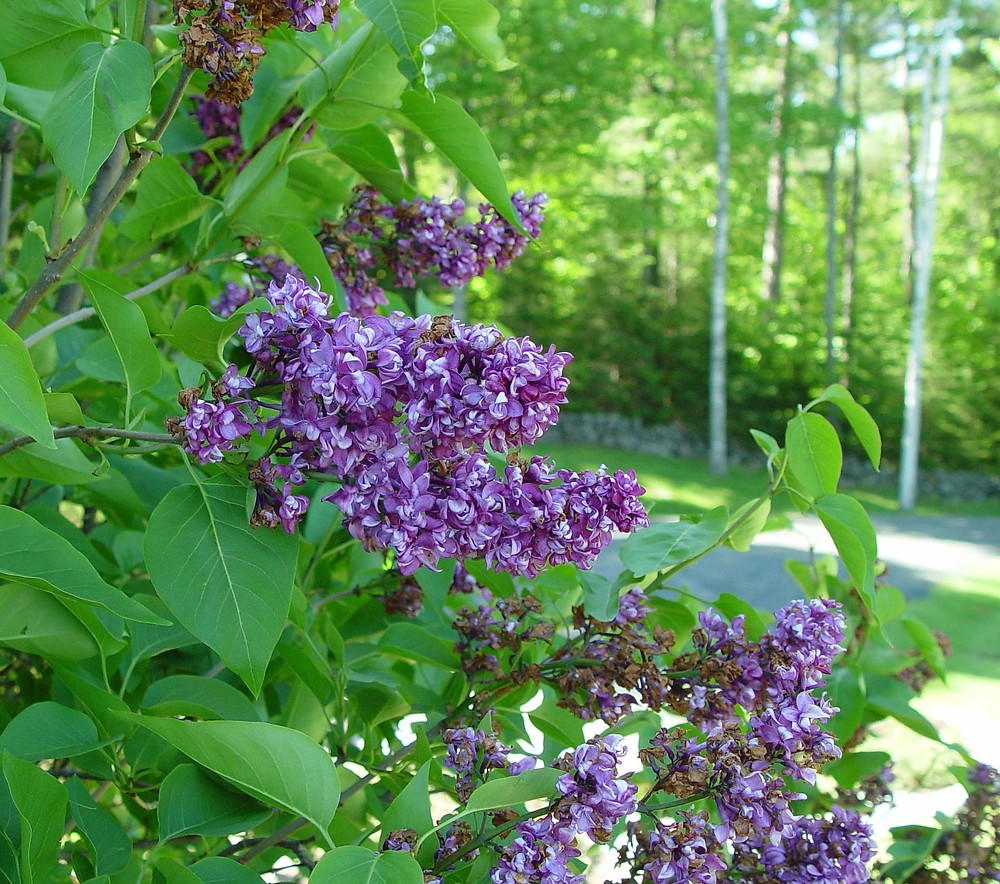
Oleaceae Syringa reticulata, Japanese tree lilac
Small tree, net-like leaf venation, simple entire rounded leaves held oppositely, persistant upright capsules in clusters, panicles of flowers, paired terminal buds, prominent horizontal lenticels all the way down trunk
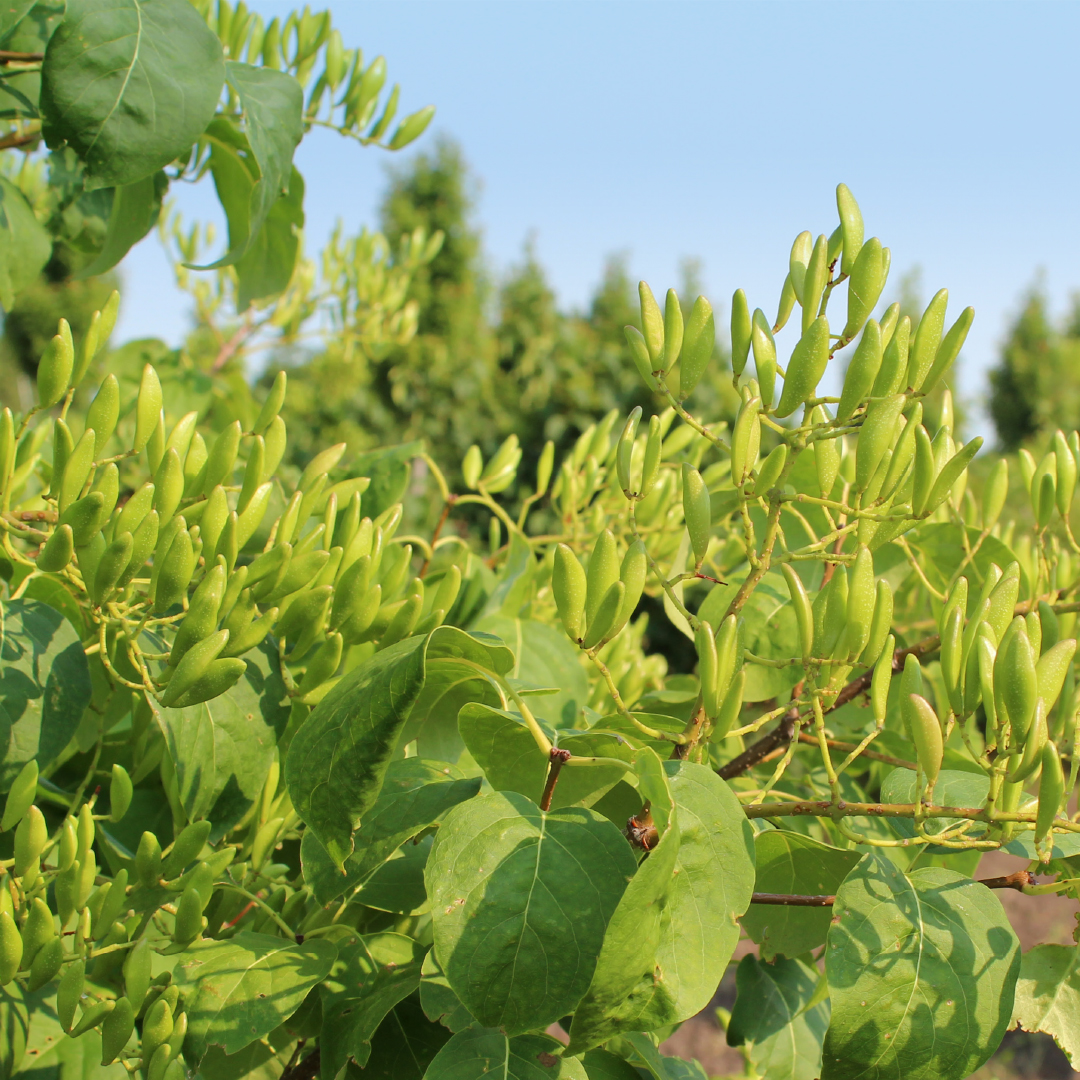
Sapindaceae Acer negundo, boxelder
Pinnately compound leaves (3-5 pointed leaflets with some lobing), oppositely arranged, scraggly/shaggy, greenish terminal buds, samaras held at narrow V-shaped angles, newest twigs are smooth and green or bluish or purplish/red
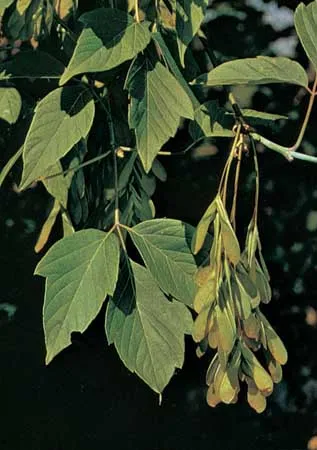
Oleaceae Fraxinus sp., ash
Opposite arrangement, pinnately compound leaves (typically 7 leaflets), large brown terminal buds that are short and round, single samaras held in clusters, bark has distinct ridges often diamond-shaped, clusters of flower galls
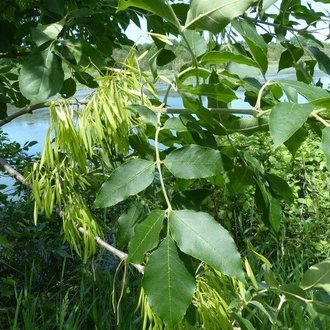
Fabaceae Cladrastis kentukea, yellowwood
Medium-sized tree, odd-pinnately compound leaves with large leaflets and entire margins, both leaves and leaflets are arranged alternately, buds are naked and completely covered by stem bases, leaf scars look like donuts, no true terminal buds, fruits are flattened seed pods that dangle in clusters at the ends of twigs, smooth gray bark
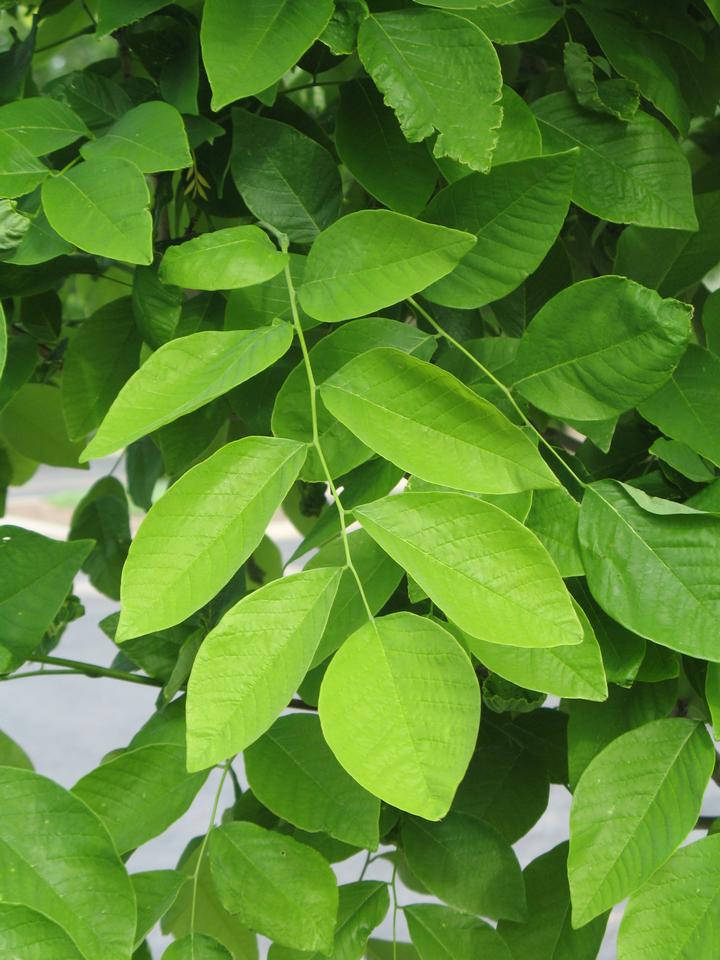
Juglandaceae Carya cordiformis, bitternut hickory
Odd pinnately compound leaves, opposite leaflets but alternate leaves, finely serrated margins, lanceolate leaflets with acute tips, glabrous surface, twigs are smooth with true terminal buds (bright yellow, valvate), small rounded fruits enclosed in husks
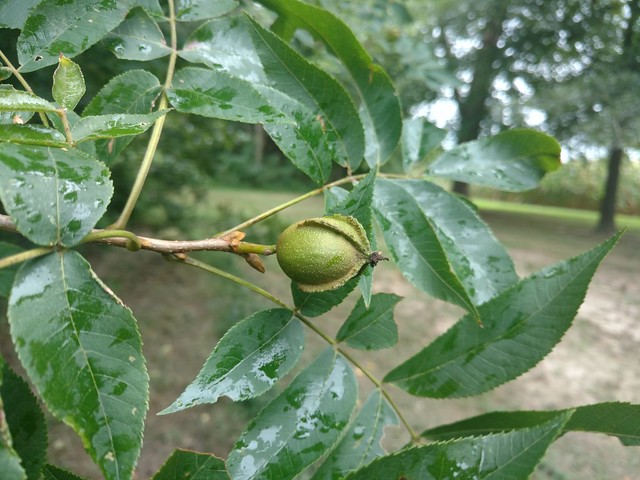
Fabaceae Gymnocladus dioicus, Kentucky coffeetree
Bipinnately compound leaves, leaflets have acute tips, large leaf scars, very small appressed buds and no true terminal buds, large salmon-colored piths, platy bark with narrow scaly ridges, low drooping branches, large but short seed pods with big black seeds
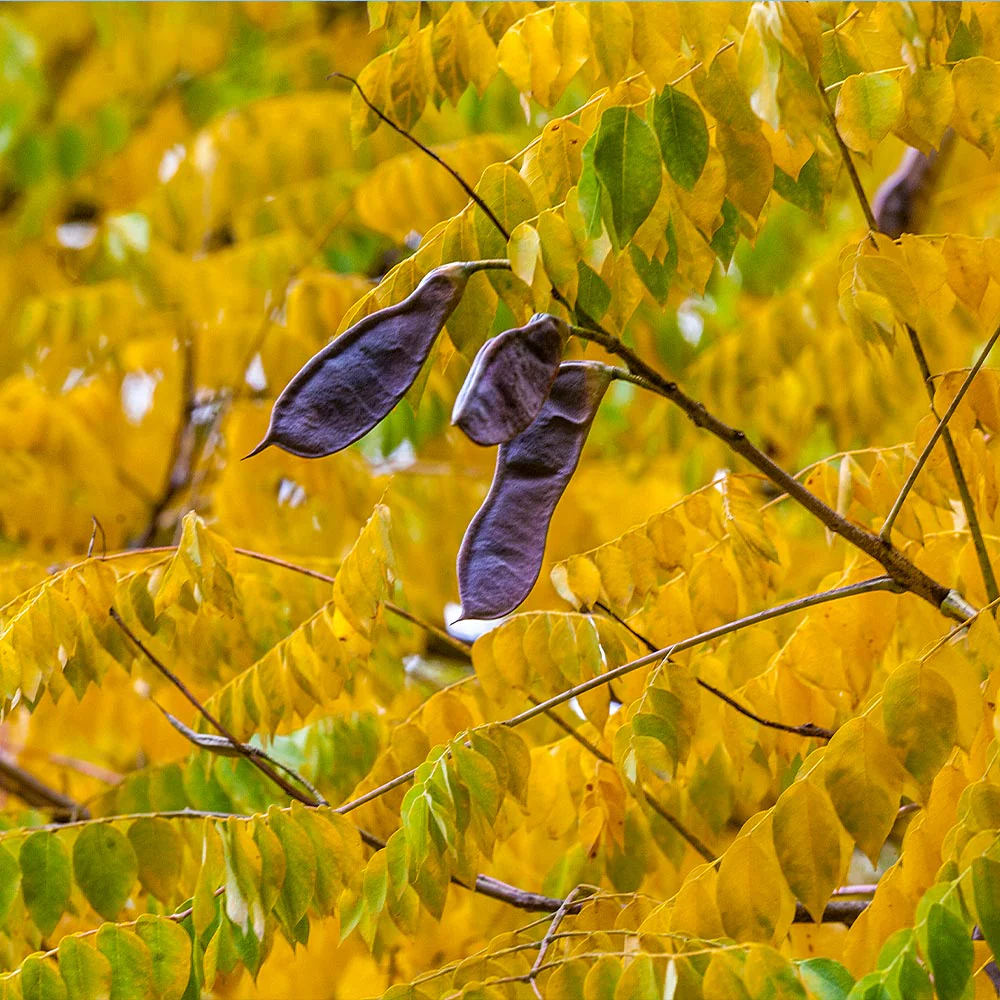
Juglandaceae Juglans nigra, black walnut
Odd pinnately compound leaves, small terminal leaflets, lanceolate and acute, true dark brown fuzzy terminal buds, large and spreading form, large green nuts that turn black, large leaf scars that look like sloth faces, strongly blocky bark that is chocolately brown underneath and roughly furrowed in a diamond pattern
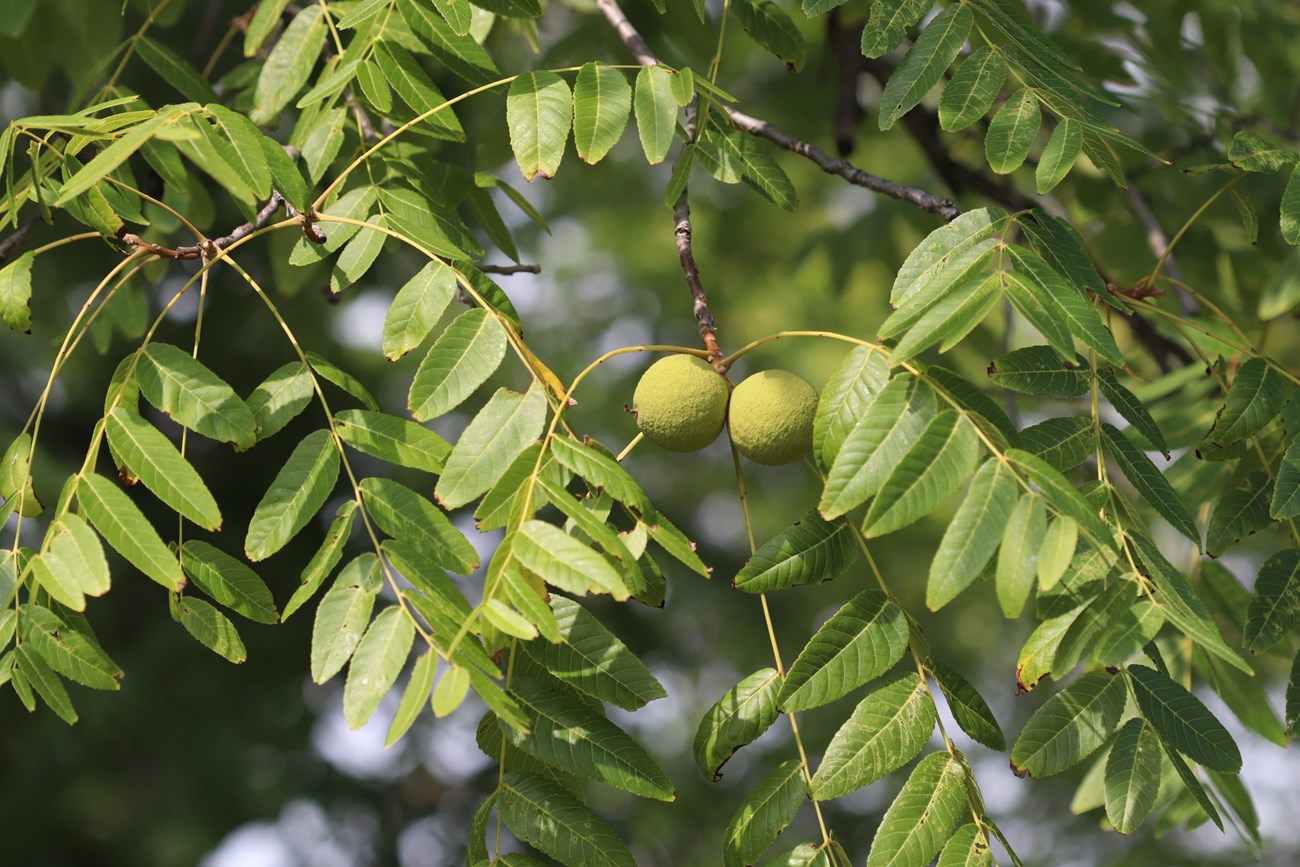
Fabaceae Gleditsia triacanthos, honeylocust
Open canopy, huge thorns often in clusters, long seed pods that are flat and often twisted, pinnately or bipinnately compound leaves, opposite small leaflets with rounded tips and no terminal leaflets, alternate zig-zag leaves, small buds and no true terminal bud, prone to witch’s broom, bark has vertical exfoliating strips
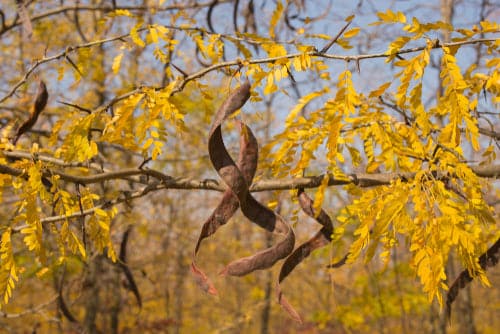
Fabaceae Cercis canadensis, eastern redbud
Leaflets appear simple but are compound (unifoliate), clustered seed pods, large shrub to small tree, fruits and bright magenta flowers come directly out of wood, entire margins and cordate bases, alternate arrangement, small tucked buds and no true terminal buds, larger flower buds, reddish bark that is exfoliating/strippy
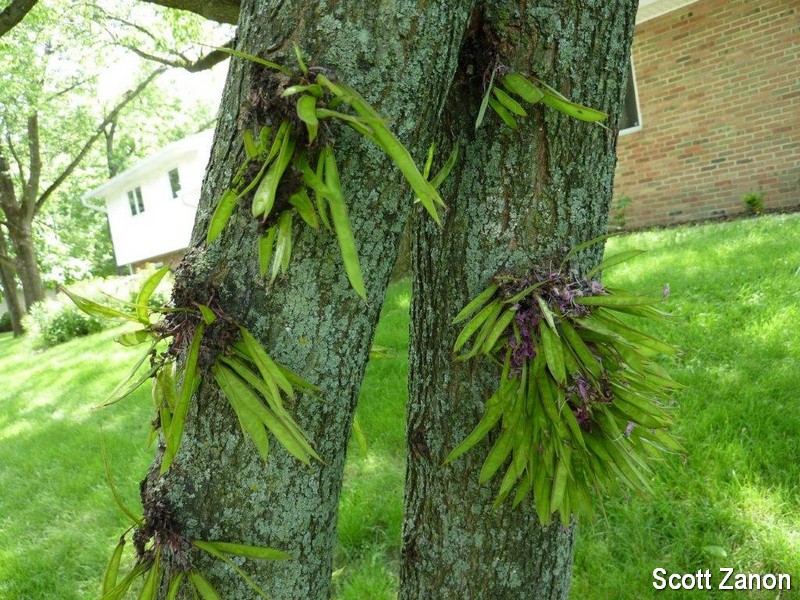
Fabaceae Robinia pseudoacacia, blacklocust
Odd pinnately compound leaves, small seed pods hang in clusters, paired spines on twigs adjacent to leaf scars, small lateral buds, denser canopy, twisty gnarled bark with deep furrows and interlacing ridges
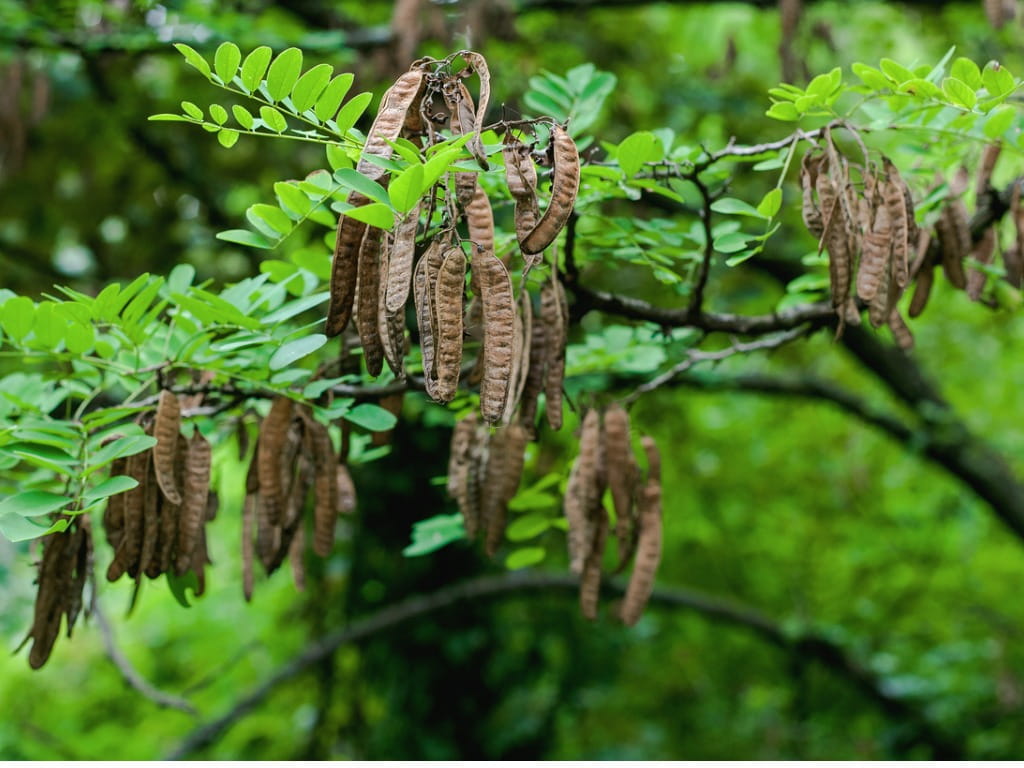
Juglandaceae Carya illinoinensis, pecan
Large tree, odd pinnately compound leaves, distal leaflets are longer and bigger, serrated margins, lanceolate curved sickle-like leaflets, buds are pubescent and brown, lateral buds stick out from twig, alternate arrangement, bark has finely textured ridges and furrows, football-shaped nuts enclosed by 4-seemed dehiscent husks
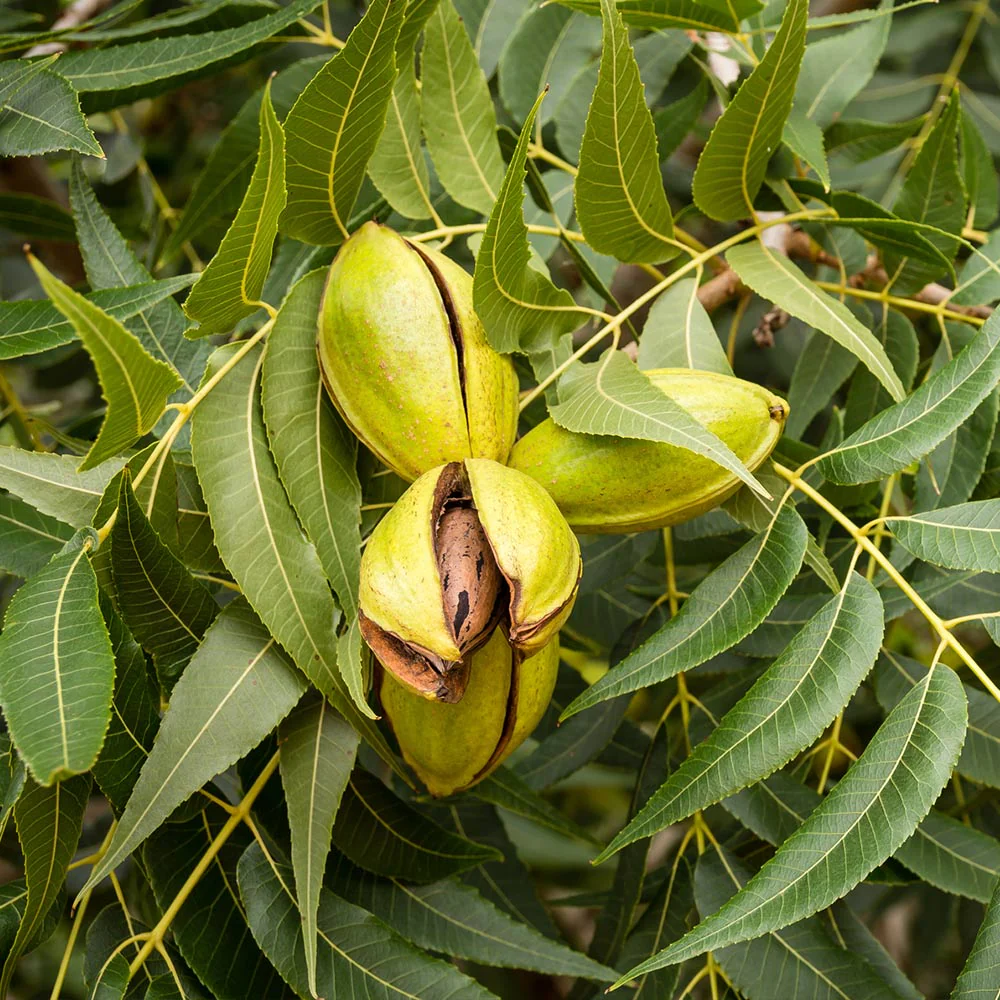
Rosaceae Prunus americana, wild plum
Thicketing shrub to small tree, simple alternately arranged leaves with finely serrated margins, blunt lateral thorns on twigs, grayish bark with long flaky strips, horizontal lenticels on small branches, small pointed imbricate buds and true terminal buds, often infected with black knot
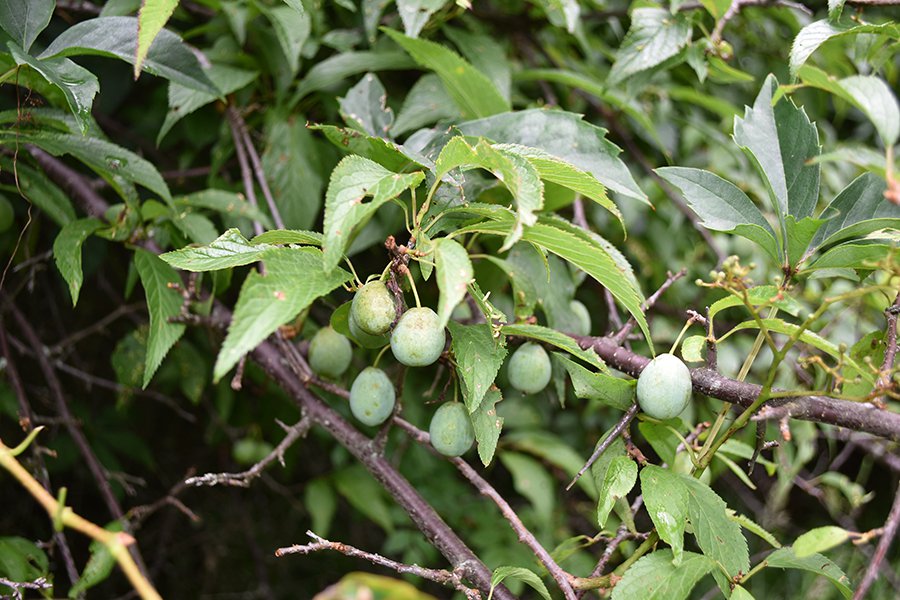
Rosaceae Aronia melanocarpa, black chokeberry
Small shrubs, small red imbricate beds and true terminal buds, bright red fall foliage, small alternate finely serrated leaves, dark hairs running along midribs, waxy new growth, lenticeled SGB, small dark purple fruits held in clusters
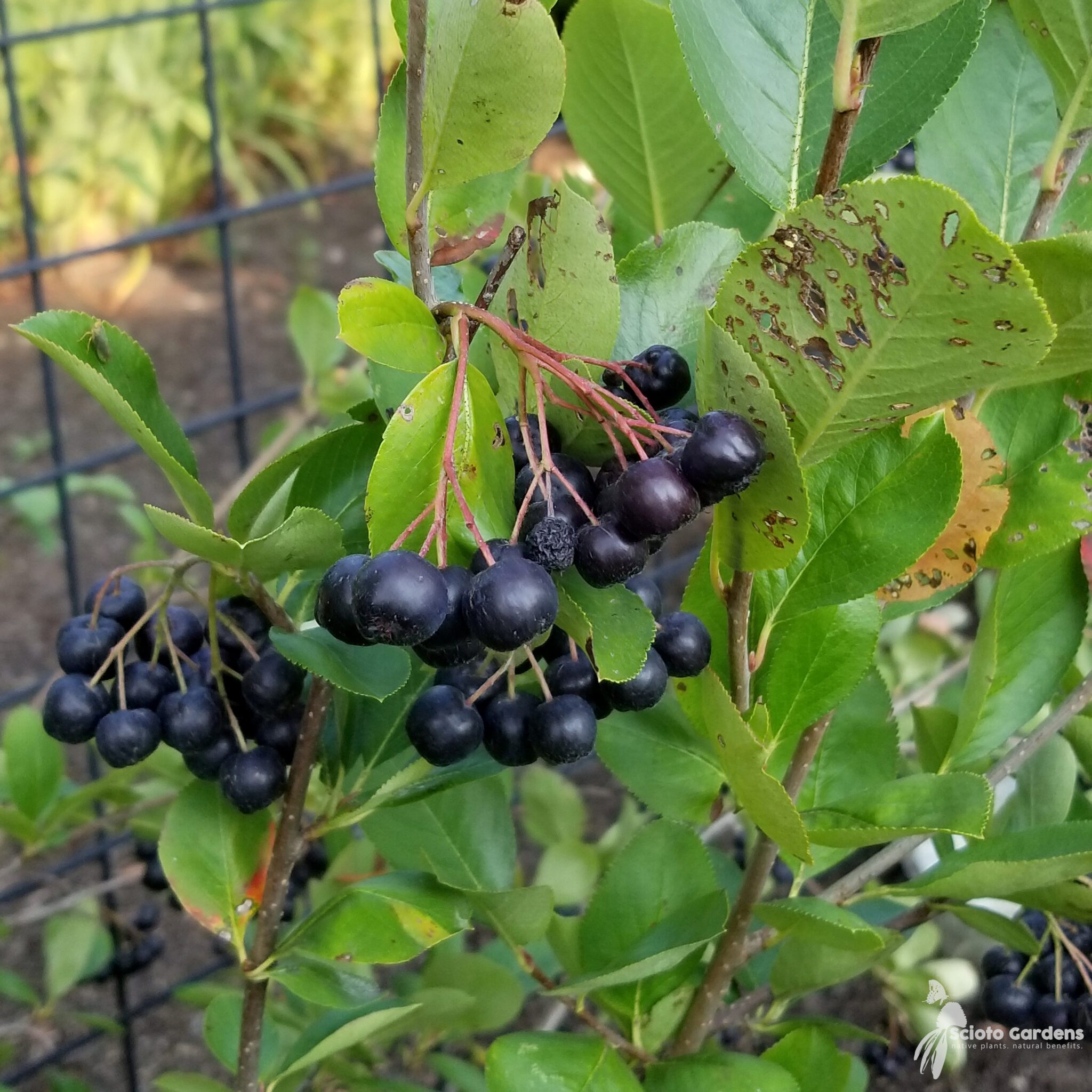
Rosaceae Malus sp., apple
Small trees, simple cremulate/serrate margins, pubescence on petioles and imbricate buds, alternatelyarranged, tangled branches and twisted trunk, spur shoots on older growth, thick/leathery leaves, smooth bark with round lenticels on young bark, scrappy multicolored textured mature bark, commonly root sucker and water sprout, pome fruits
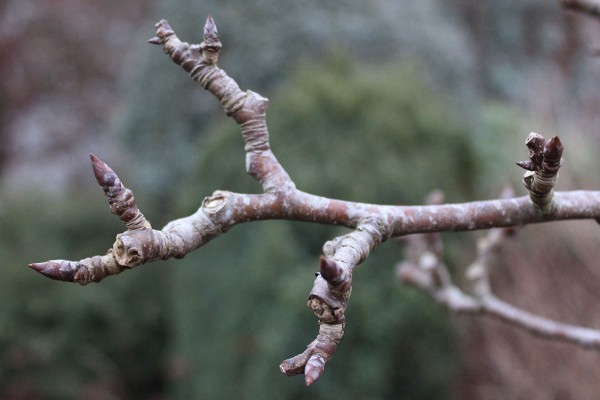
Hydrangeaceae Hydrangea quercifolia, oak-leaf hydrangea
Red-oak looking large leaves with 5-7 lobes, white flowers that turn brown, infertile flowers surrounding seed-bearing flowers, newest growth waxy and glabrous, mature bark orange-ish and exfoliating, opposite arrangement, divergent brown buds
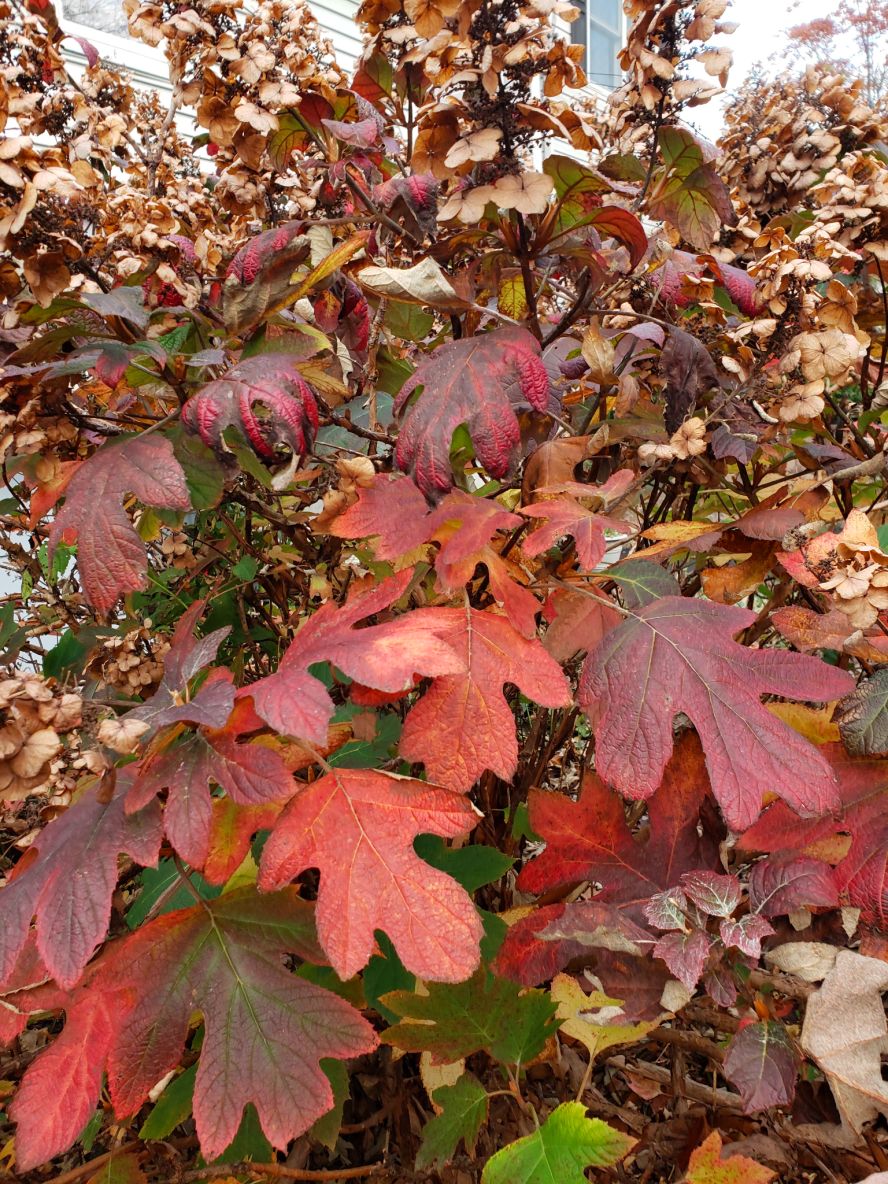
Malvaceae Tilia tomentosa, silver linden
Tall tree with open grown bell-shape form, simple chordate leaves with acuminate tips, uneven bases, lighter underside and finely hairy, young branches and buds fuzzy, no true terminal buds, buds have two-overlapping scales, strong vertical bark with narrow ridges and furrows, fruits are nutlets supertended by large leafy bracts
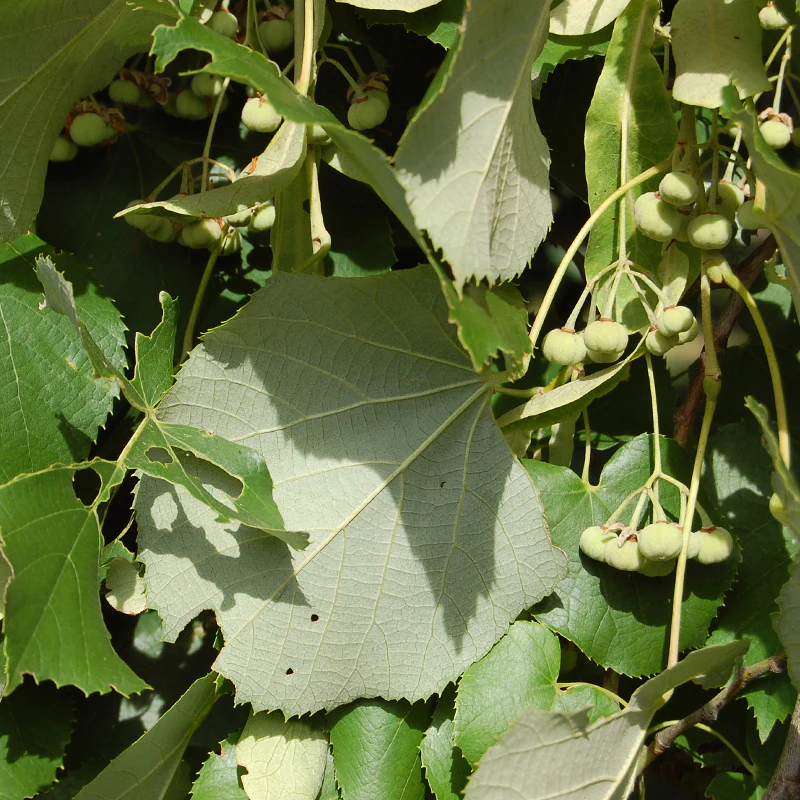
Malvaceae Tilia americana, American basswood
Tall singular trunk, conical form, fruits are nutlets with large leafy bracts, glabrous chordate leaves with fine serration, uneven bases, smooth green/reddish young twigs, strong vertical texture with narrow ridges and furrows, no true terminal buds
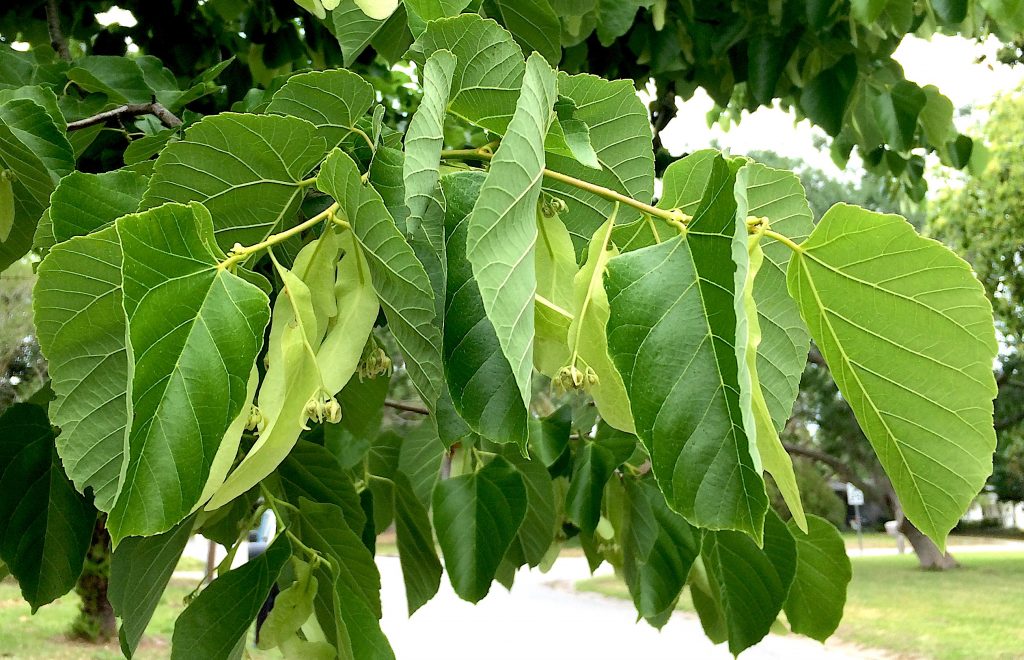
Rosaceae Prunus serotina, black cherry
Reddish spines where linear clusters of fruits were, alternate arrangement, small dark imbricate buds and true terminal buds, lanceolate leaves, potato chip bark on mature trees, young twigs have horizontal lenticels, winter twigs are slender and curved and irregular , often infected with black knot
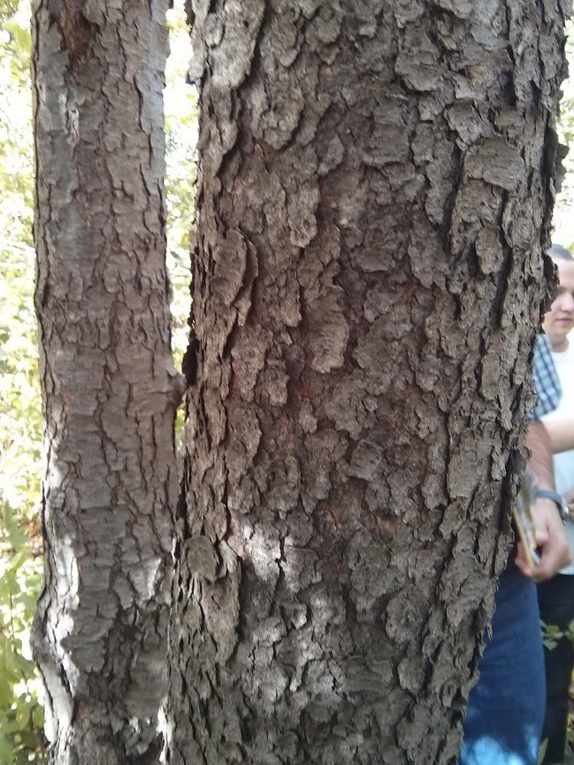
Rosaceae Amelanchier sp., serviceberry
Large shrubs to multitrunked small trees, always SGB, reddish long and pointed buds, true terminal buds, alternate arrangement, rounded leaves
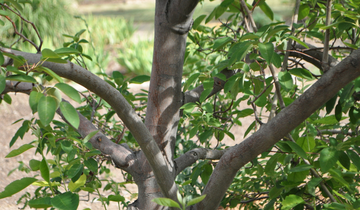
Rosaceae Pyrus calleryana, Callery pear
Small woody pome fruits, prone to splitting, simple alternate leaves with crenulate margins, terminal buds, blocky/platy bark neatly furrowed, water and stump sprouting, many white flowers, large white fuzzy buds, glossy orange-red fall color
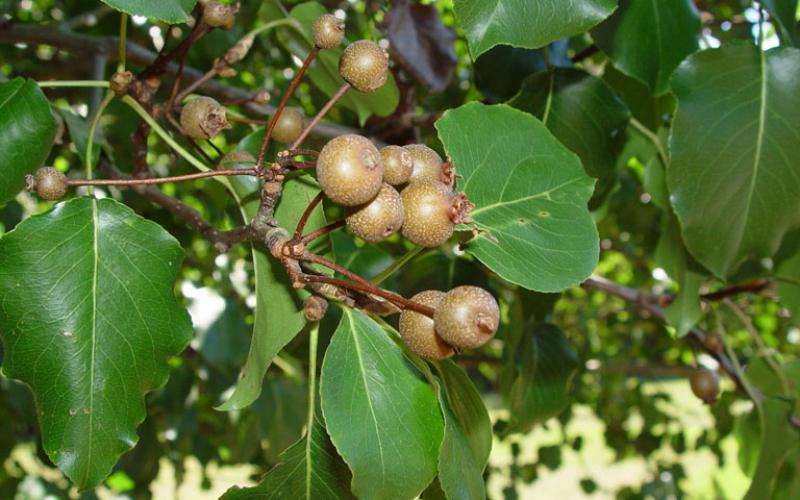
Fagaceae Quercus macrocarpa, bur oak
Large trees, open and spreading form, lobed spatulate leaves with no bristles, glossy top with paler underside, deep sinuses in middle of leaf, large acorns, seed covered almost entirely by fringed cap, bark has vertical ridges and deep furrows, round clustered terminal buds
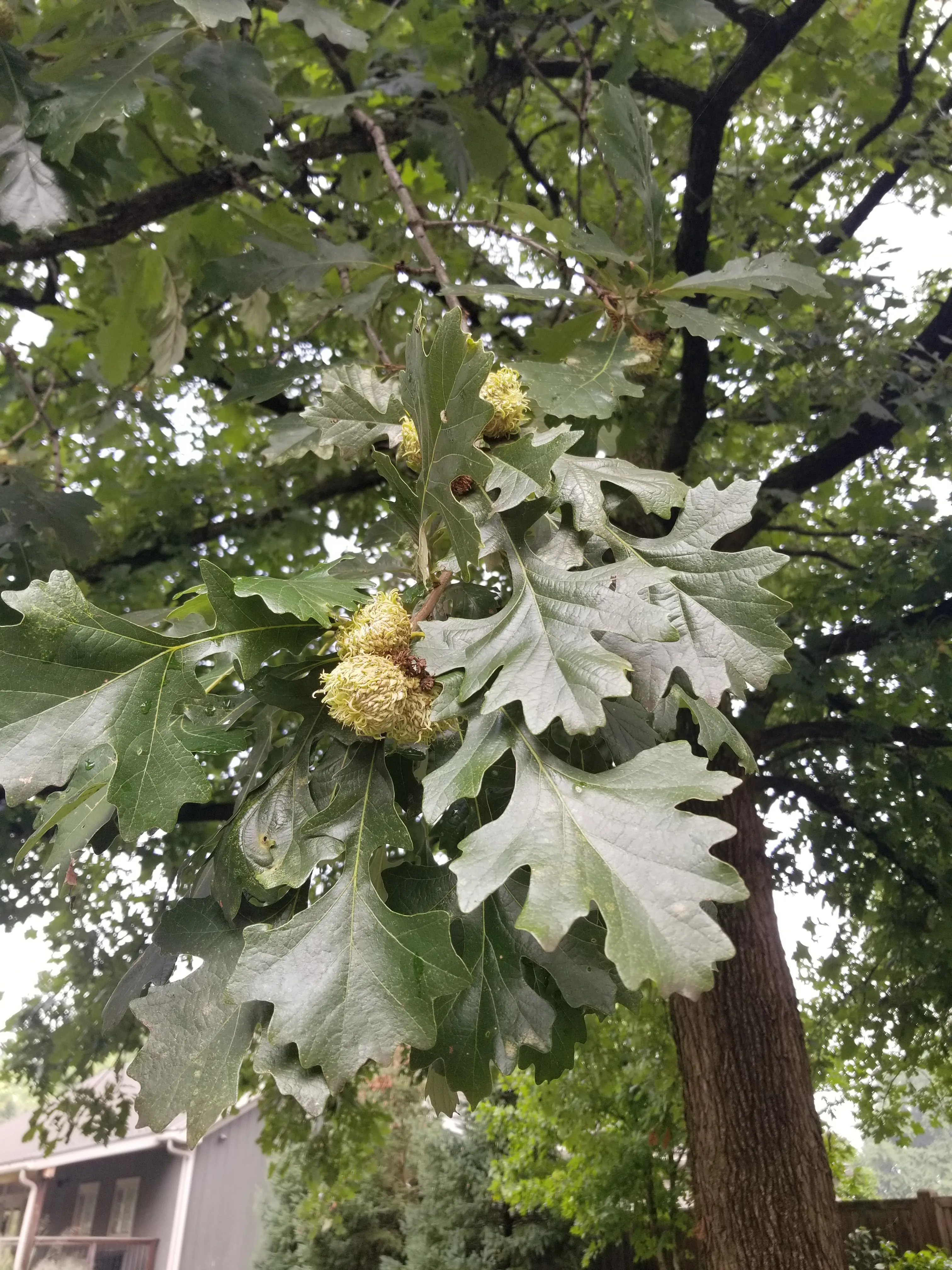
Fagaceae Quercus alba, white oak
Stiff lobed leaves without bristles, U-shaped sinuses, middle lobes the longest, tapered bases, clustered terminal buds, small branches are smooth and grayish-brown, shiny egg-shaped oblong acorns with bowl-shaped caps, chippy light gray bark
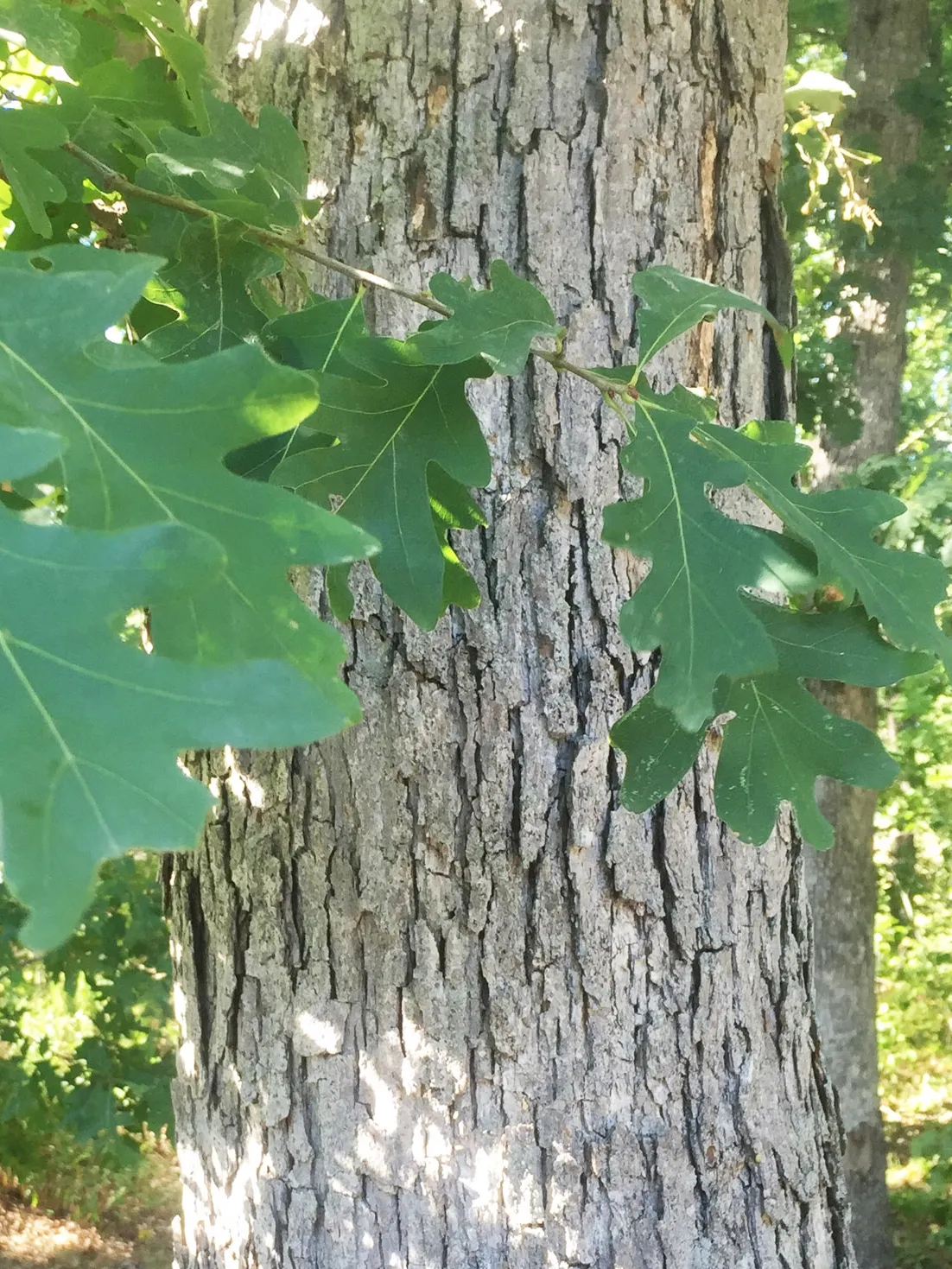
Fagaceae Quercus imbricaria, shingle oak
Simple leaves long and narrow with entire margins and single bristles, no lobes, glossy on top, clustered pointy terminal buds, little texture on bark, small round acorns with bowl-cut caps
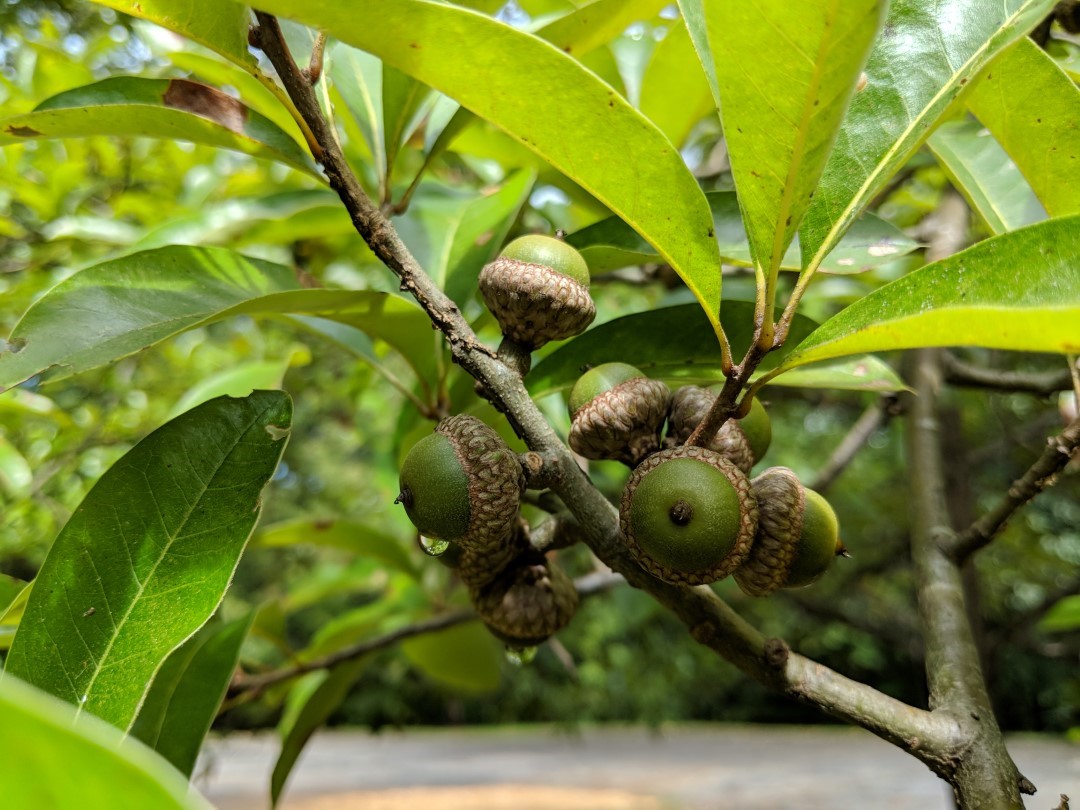
Fagaceae Fagus grandifolia, American beech
Fruits are tirangular nuts covered by spiny hooked husks, SGB all throughout tree, simply papery leaves with V-shaped venation and pointed tips, serrated margins, long slender pointy terminal buds
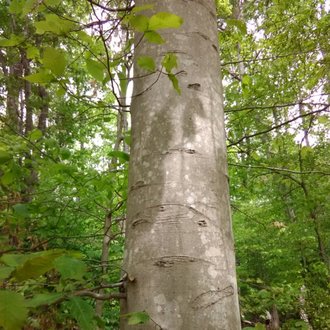
Fagaceae Quercus palustris, pin oak
Excurrent trees with drooping lower branches, upright form, lobed leaves with deep sinuses and pronounced bristeles, small egg-shaped buds, clustered terminal buds, vertical bark orientation with uniform color and shallow furrows, less texture on younger branches, small pointy striped acorns with scaled caps, iron chlorosis is common
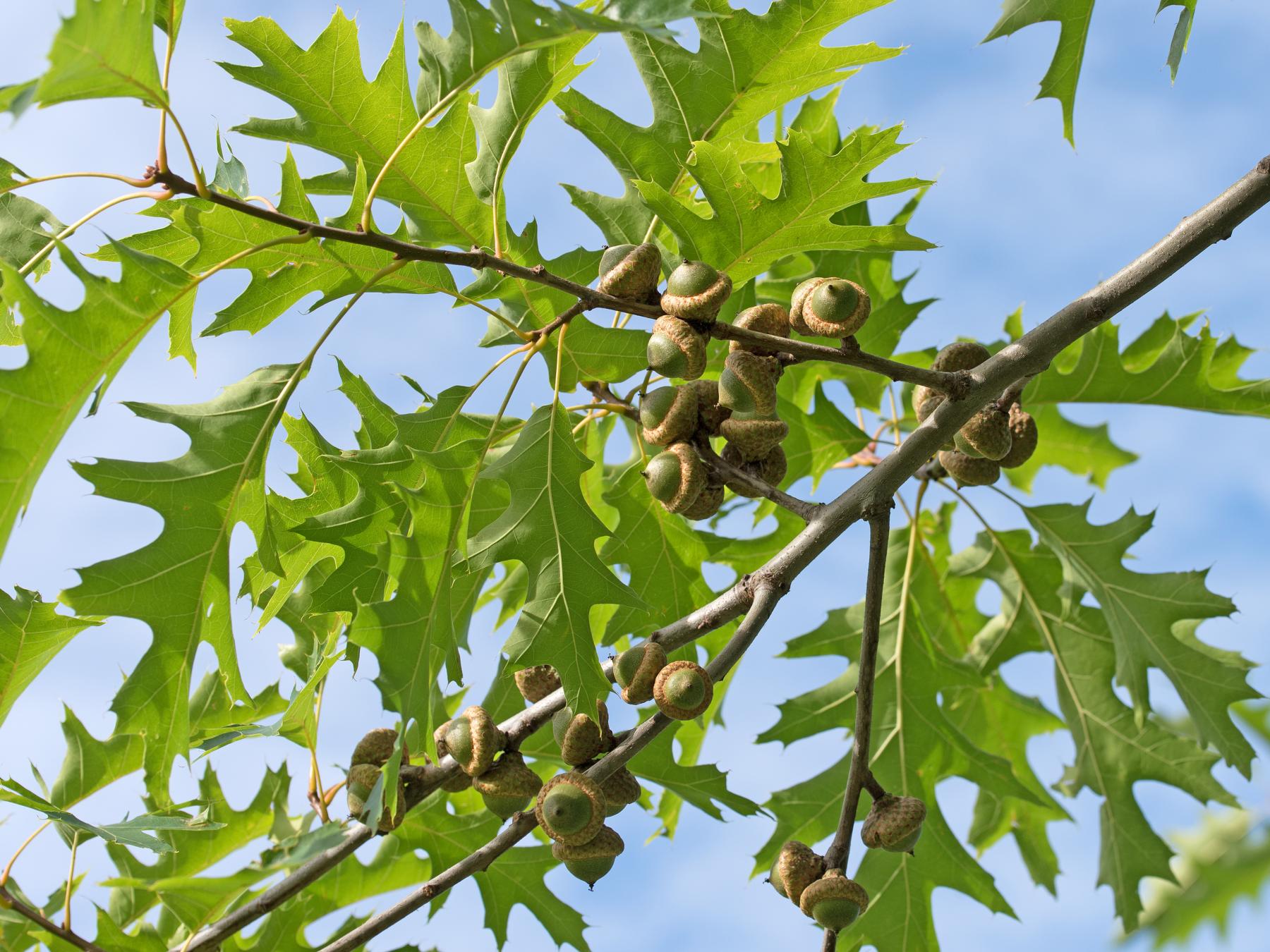
Fagaceae Quercus rubra, northern red oak
Decurrent trees, lobed leaves with bristles and shallow sinuses, petioles often long and red, thick ridges and furrows, flat wide ridges on younger bark with light gray furrows, clustered terminal buds, ellipitcal acorns with shallow scaled caps
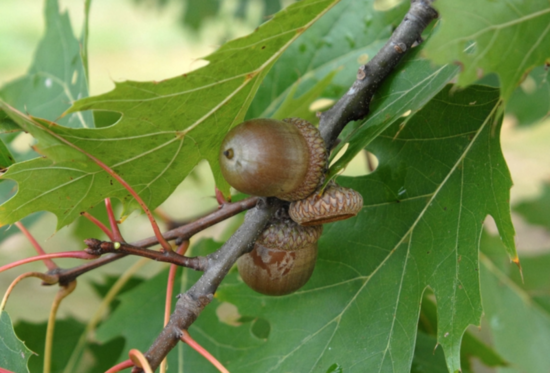
Fagaceae Quercus montana, chestnut oak
Leaves with crenulate margins and no lobes, bark made of long vertical rectangular blocks, pointed orange-brown buds, clustered terminal buds, dark and shiny seeds with shallow caps that have thin tapered edges
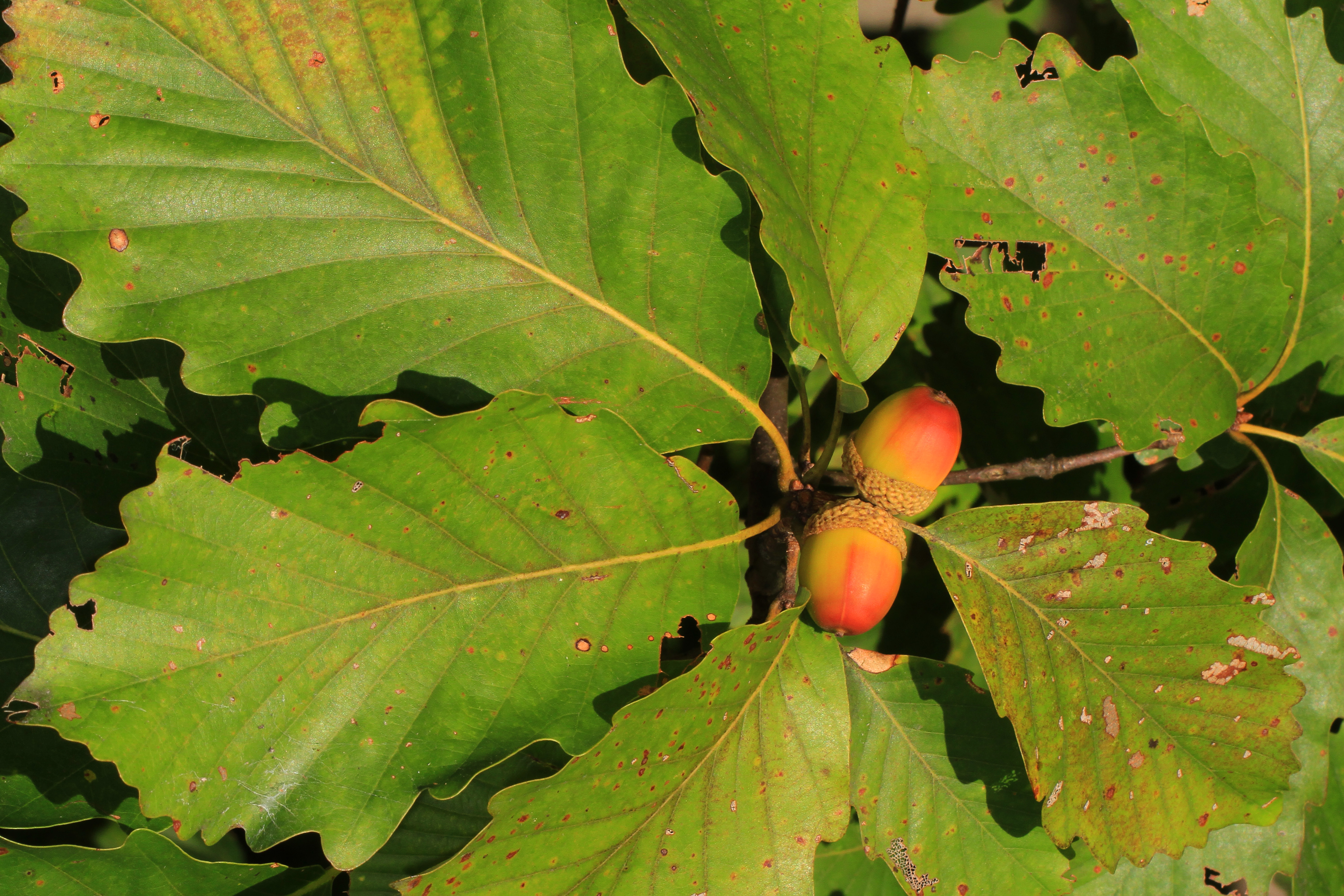
Fagaceae Quercus bicolor, swamp white oak
Spatulate leaves with small lobes, no bristles, underside of leaves pubescent and much paler, flaky grayish bark with texture even on smaller branches, blunt clustered terminal buds, acorns held on long stems, spiky bumps on caps
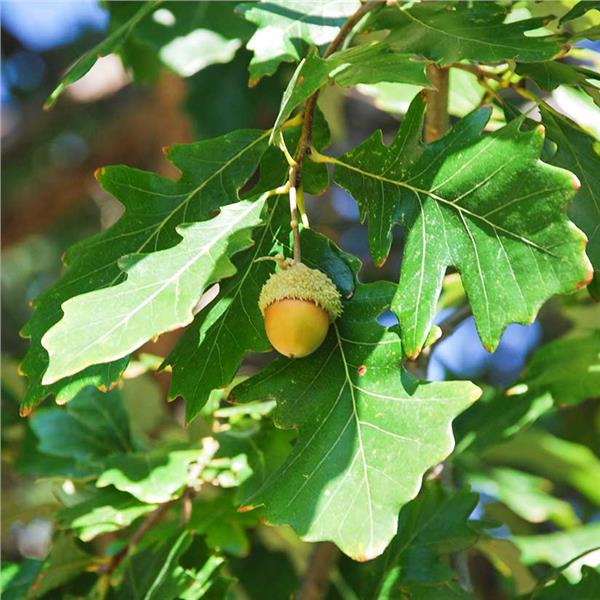
Pinaceae Picea abies, Norway spruce
Spruce with tall excurrent form, primary branches stick out horizontally and have many pendulous branchlets, big pendulous cones, short bright green needles not very spiny, thin papery bark with orange undertone
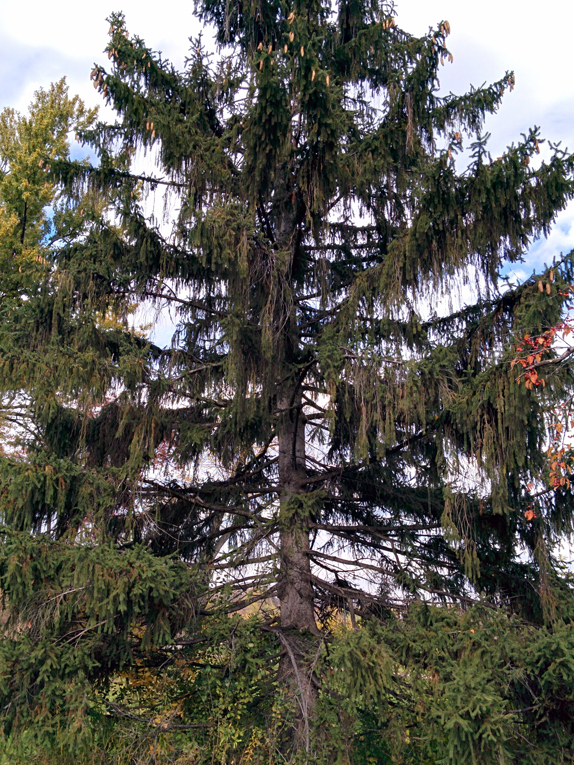
Cupressaceae Juniperus virginiana, eastern redcedar
Conifer, adult leaves made of branchlets with imbricate scales, young leaves pointy and needle-like, female cones are blue and berry-like, male cones are tiny and yellowish, strippy fibrous bark even on smaller branches
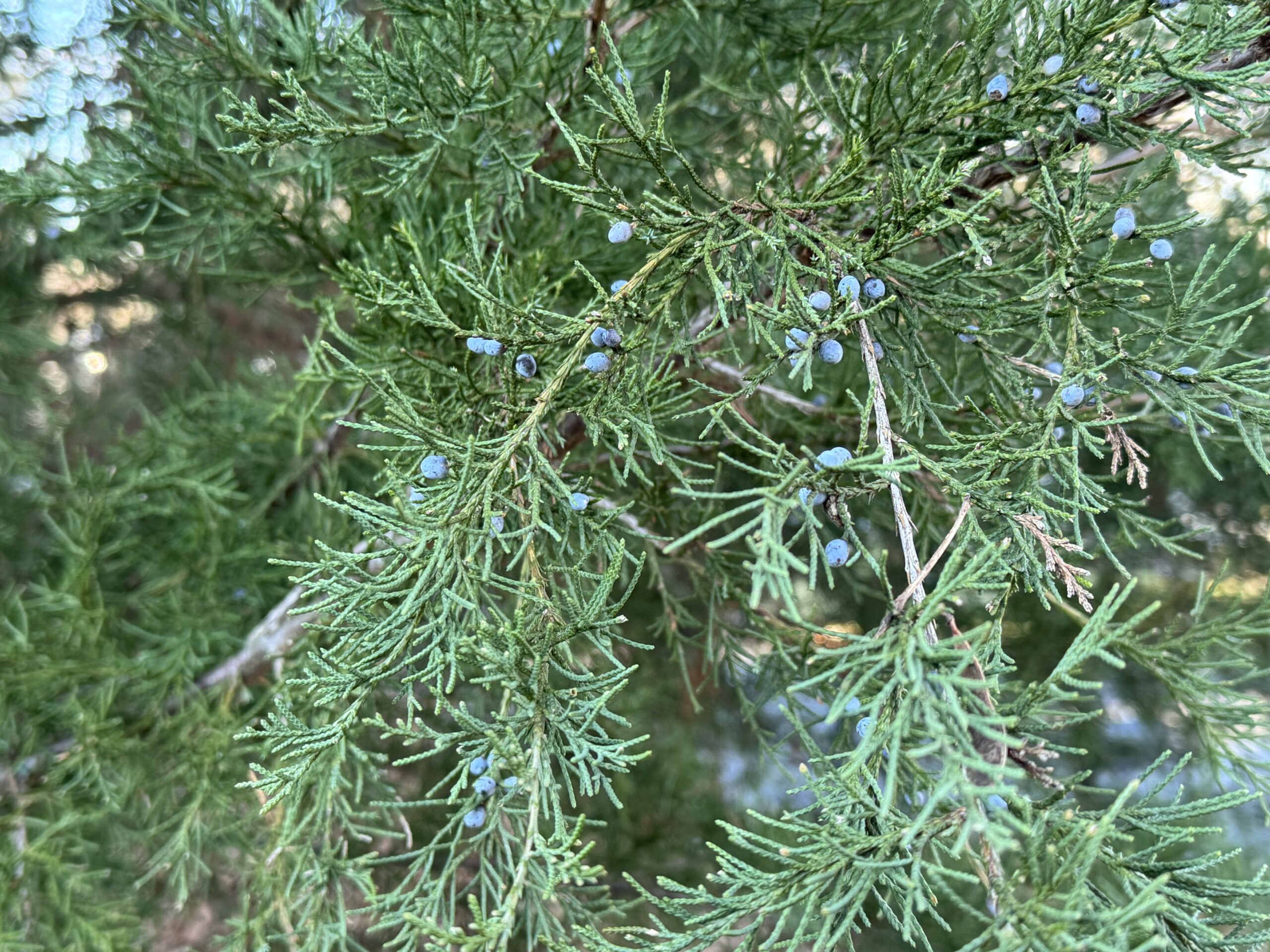
Pinaceae Abies balsamea, balsam fir
Fir with smaller stature, smooth gray bark with resinous blisters, needles sometimes two-ranked, two sets of stomatal lines on underside of needles, foliage has a citrus smell, twigs have many leaf scars
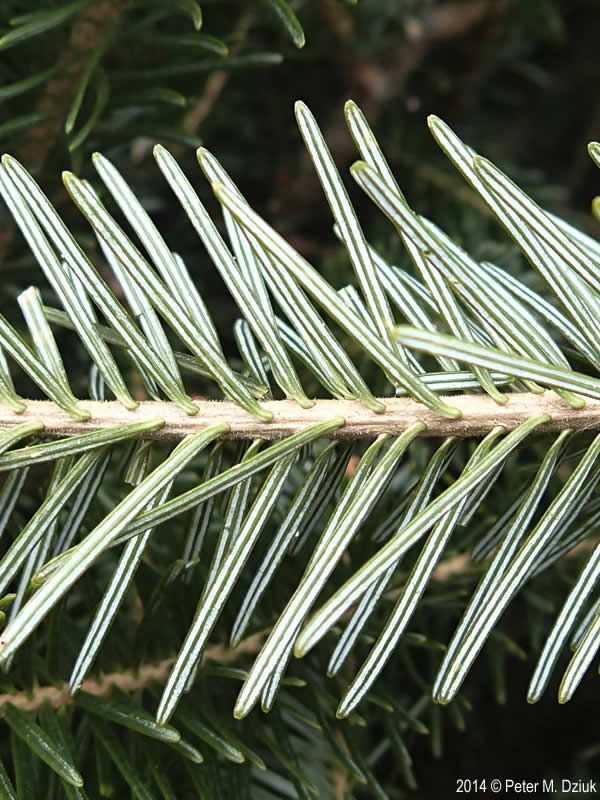
Cupressaceae Thuja occidentalis, northern white-cedar
Typically small columnar cultivations, small scaled leaves with flat fan-shaped branchlets, flexible, small female papery cones often in groups held erect, mature bark is thin and strippy
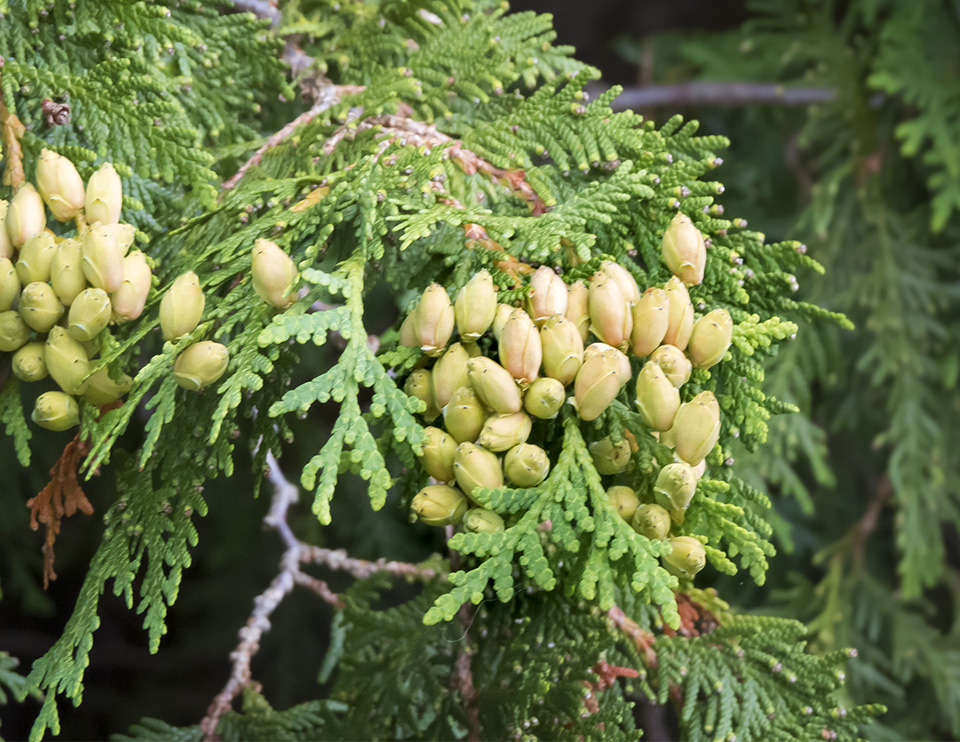
Pinaceae Picea pungens, blue spruce
Spruce typically with blude needles and waxy coating,spiky rigid needles, mature bark is flaky, young twigs are orangeish, mid-sized papery cones with notches at the tips of scales
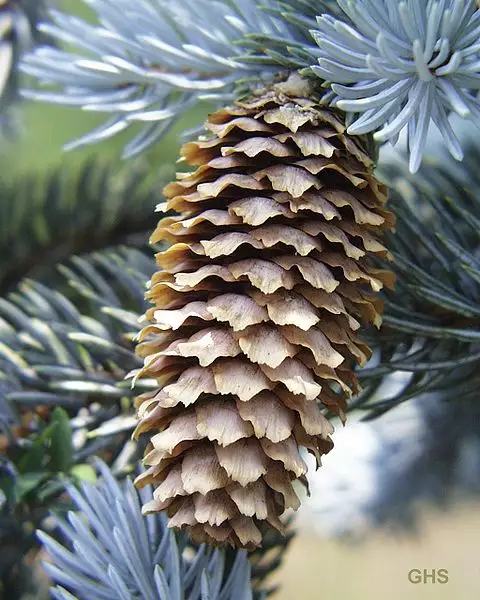
Pinaceae Picea omorika, Serbian spruce
Spruce with strongly upturned branches, prominent stomatal lines underneath needles, somewhat pendulous looking, orangeish young growth, purple immature cones that are fairly small
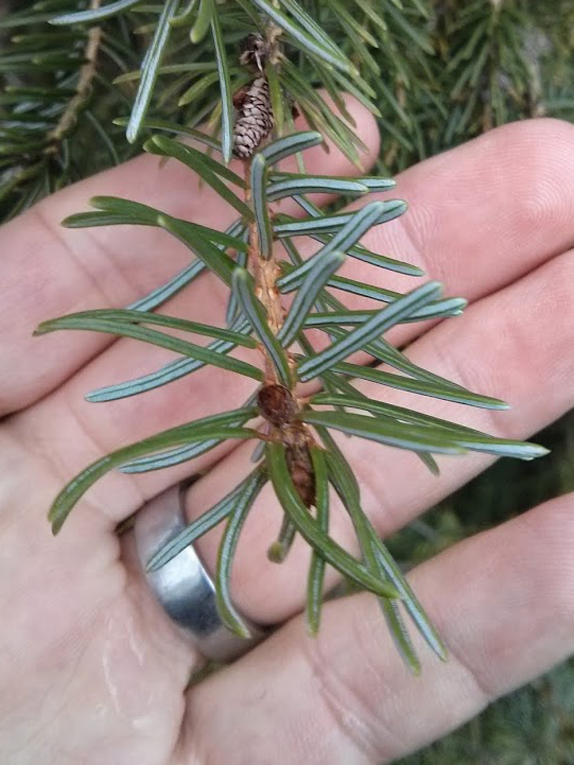
Pinaceae Picea glauca, white spruce
Spruce often with narro conical form, somewhat spiky whiteish needles, light gray scaly bark, small cones with entire margins
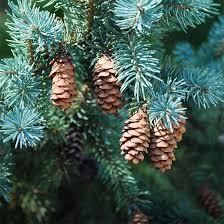
Pinaceae Abies concolor, white fir
Tall fir with flexible boughs, longer sparse needles, resinous orangeish buds, newest growth is whiteish and glaucous, ridges and furrows on mature bark, often drops lower branches
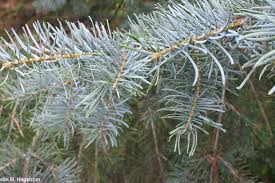
Pinaceae Pinus banksiana, jack pine
Hard pine, 2 needles per group, short twisted diverging yellow-green needles, open-grown/scrubby form, often crooked and leaning, pointed and curved serotinous cones that hug branches, exfoliating mature bark, scaly twigs
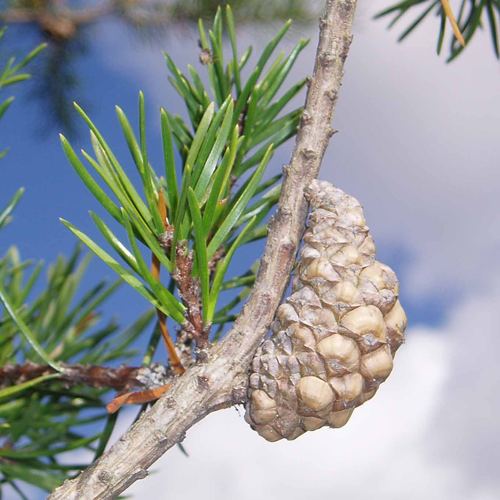
Pinaceae Pinus ponderosa, ponderosa pine
Hard pine, 2-3 needles per group, long slightly serrated needles, large orange resinous terminal buds, scaly bark with orange undertones on younger trunks, orange to reddish bark with large rectangular plates on older trunks, fairly large cones with armed umbos on scales
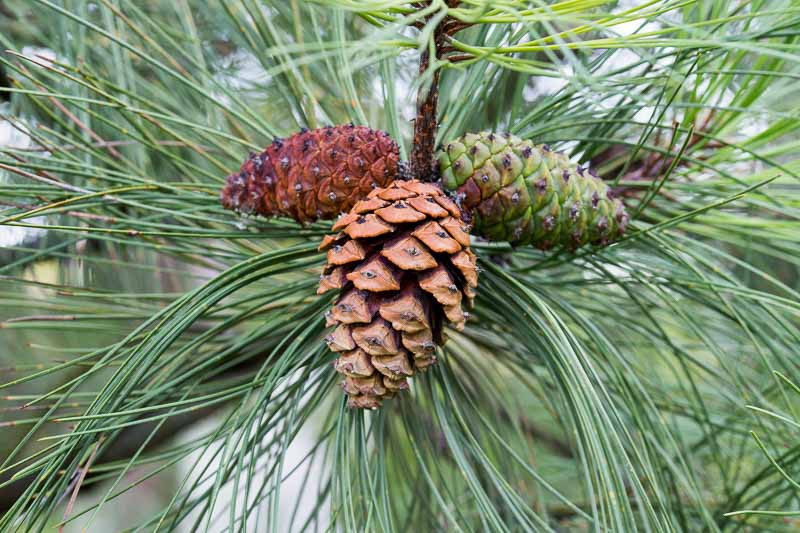
Pinaceae Pinus nigra, Austrian pine
Hard pine, 2 needles per group, flattened needles fairly long and sometimes twisted, dense foliage, dark colored bark, large white resinous terminal buds, unarmed umbos on cone scales
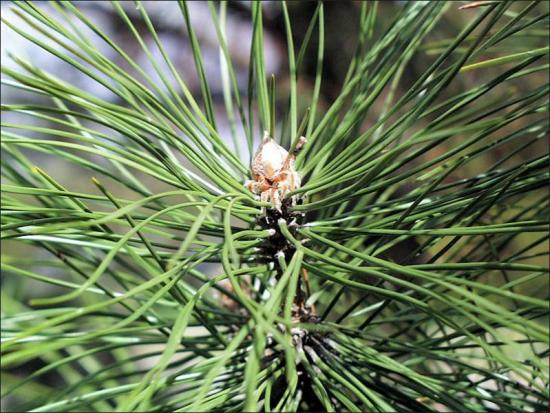
Pinaceae Pinus sylvestris, Scots pine
Hard pine, 2 needles per group, short stiff needles, pointed imbricate buds, small cones with unarmed umbos, bark is rusty orange and papery especially on smaller branches
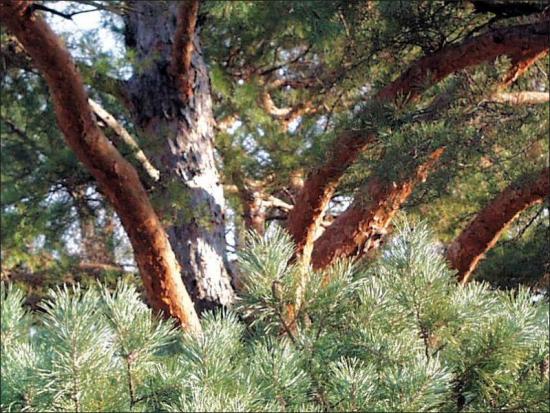
Pinaceae Pinus strobus, eastern white pine
Soft pine, 5 needles per group, soft long flexible needles, bark is mostly smooth and gray, often very tall with long horizontal branches, long slender resinous cones with flared bell-shaped scales
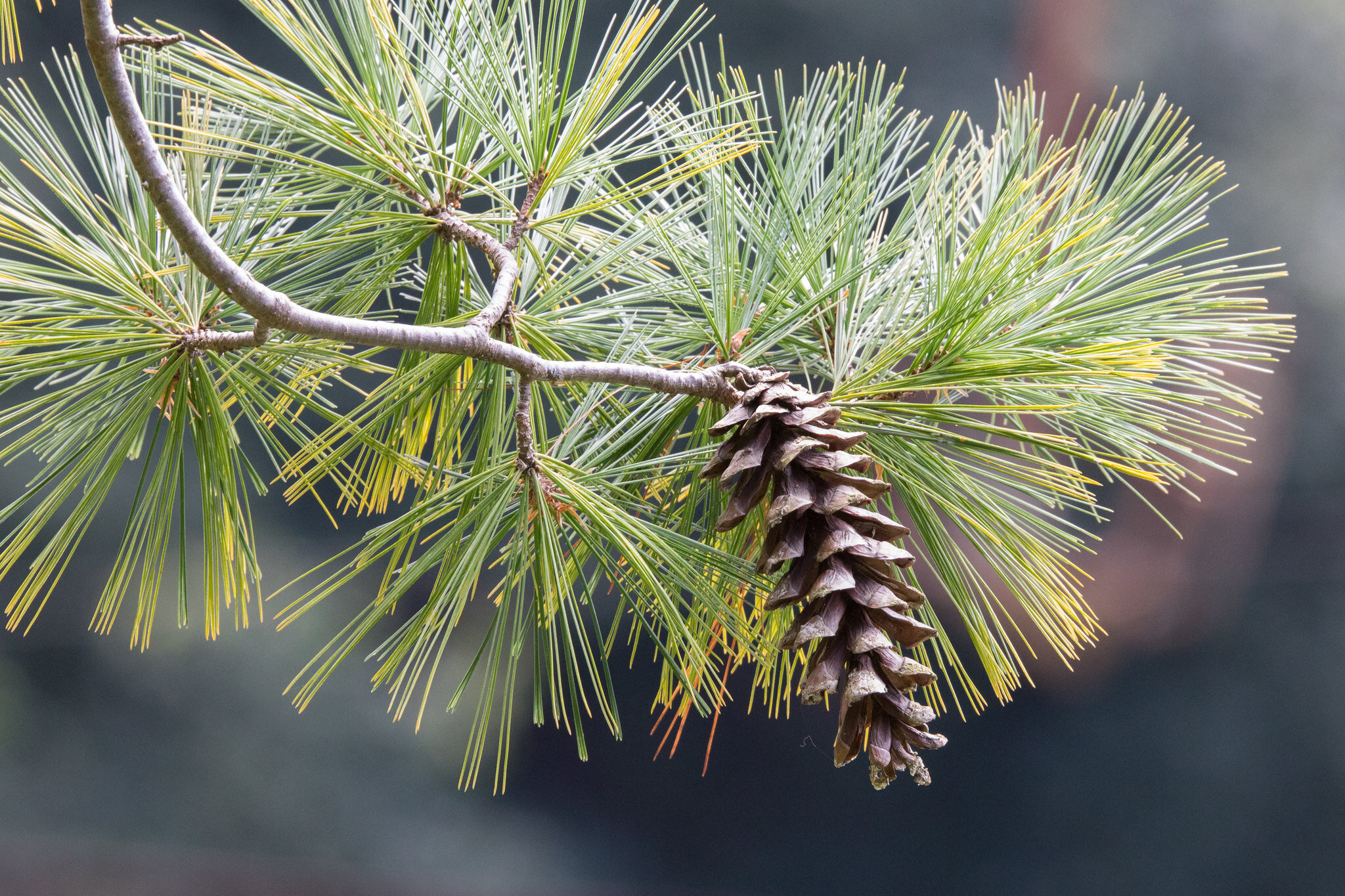
Pinaceae Pinus flexilis, limber pine
Soft pine, 5 needles per group, fairly short somewhat rigid needles often held in tufts at the ends of branches, long skinny cones with bell-shaped scales, prominently white undersides of needles
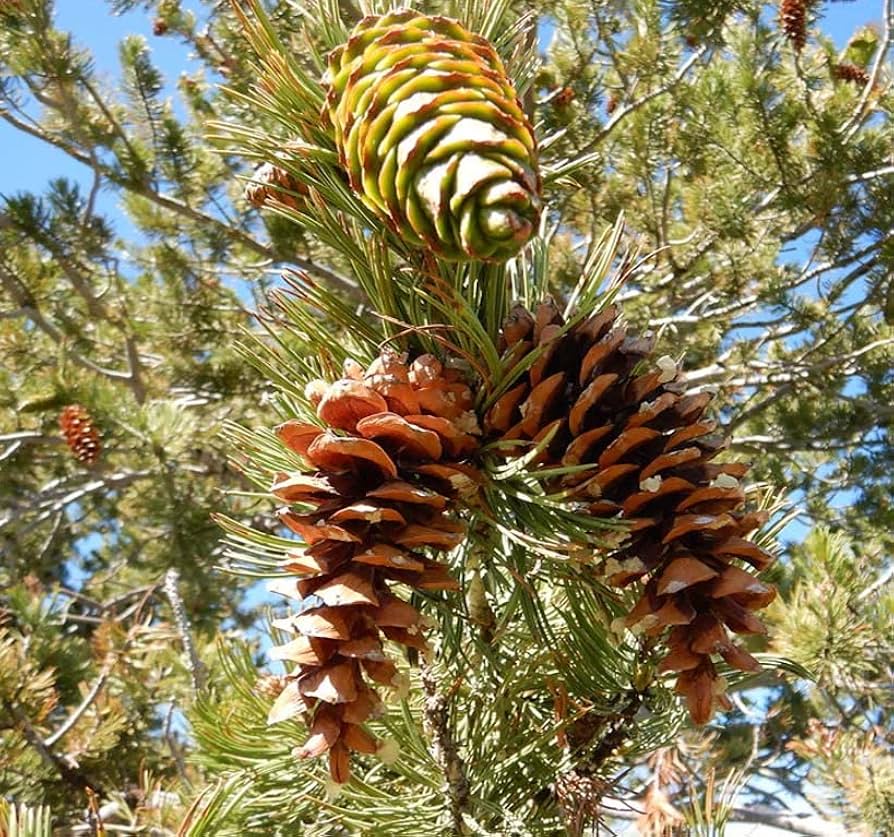
Pinaceae Pinus bungeana, lacebark pine
Hard pine, 3 needles per group, fairly short and rigid needles, typically branches low and has multiple trunks with sparse needles, pointed orange terminal buds, small cones with thick scales, exfoliating bark that looks like camouflage
